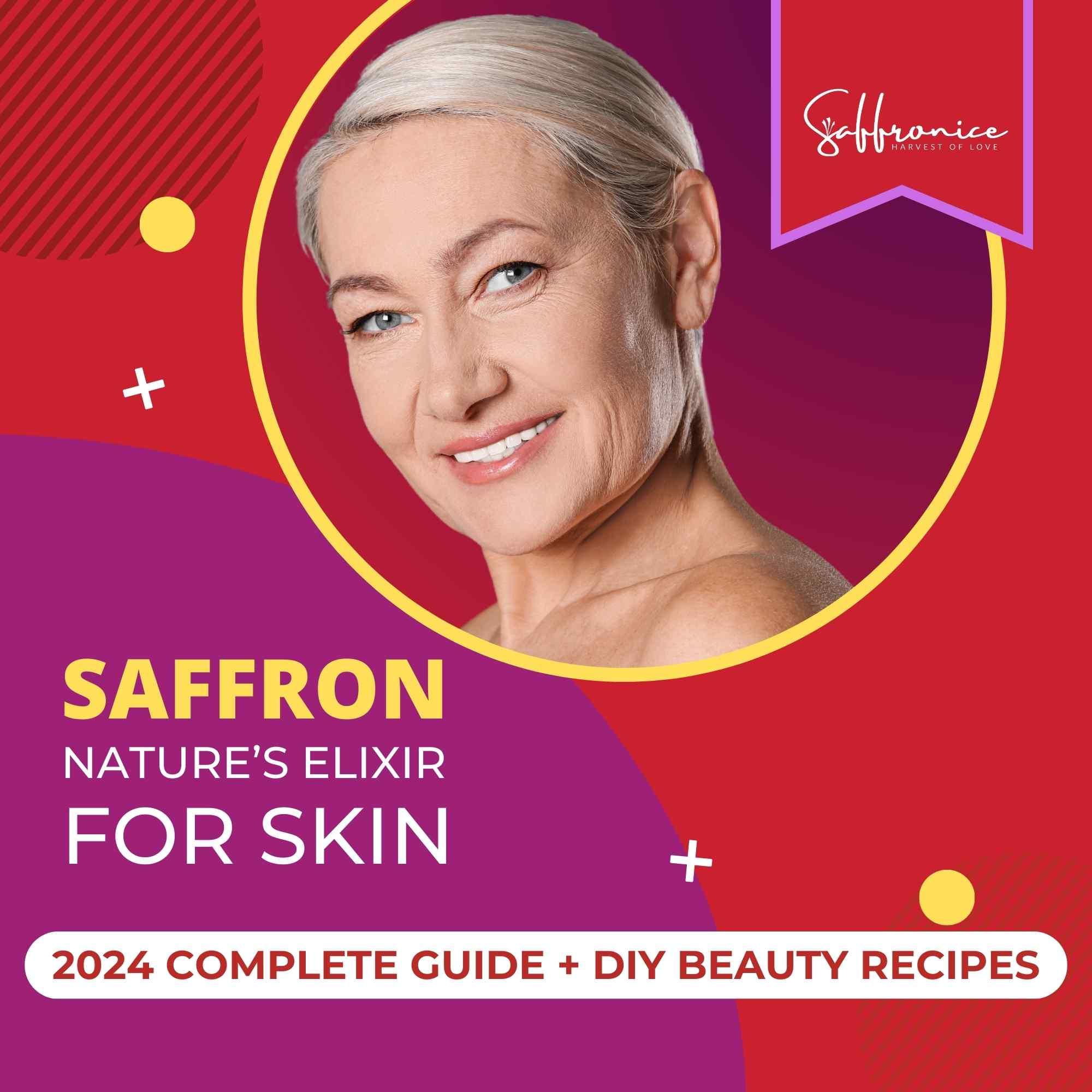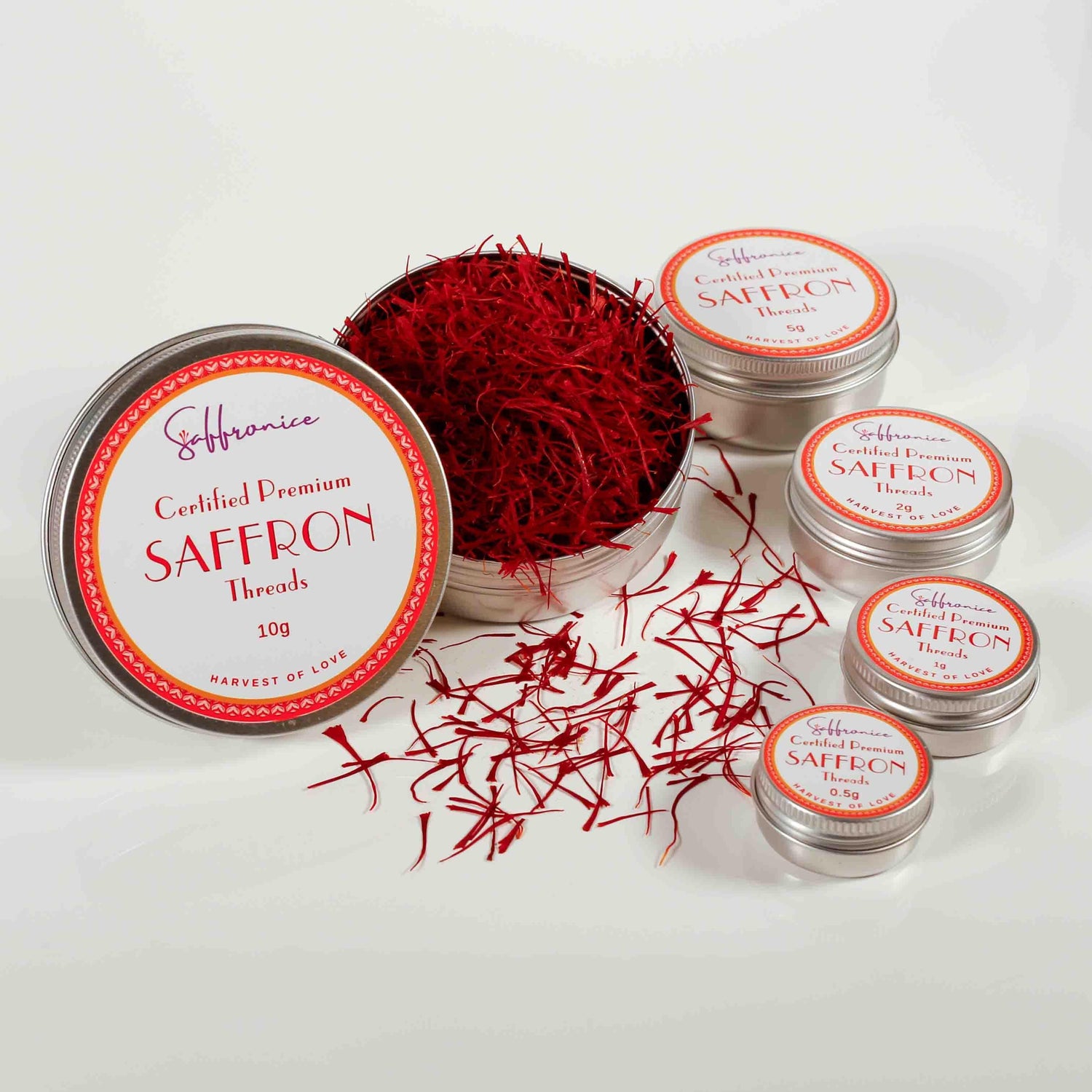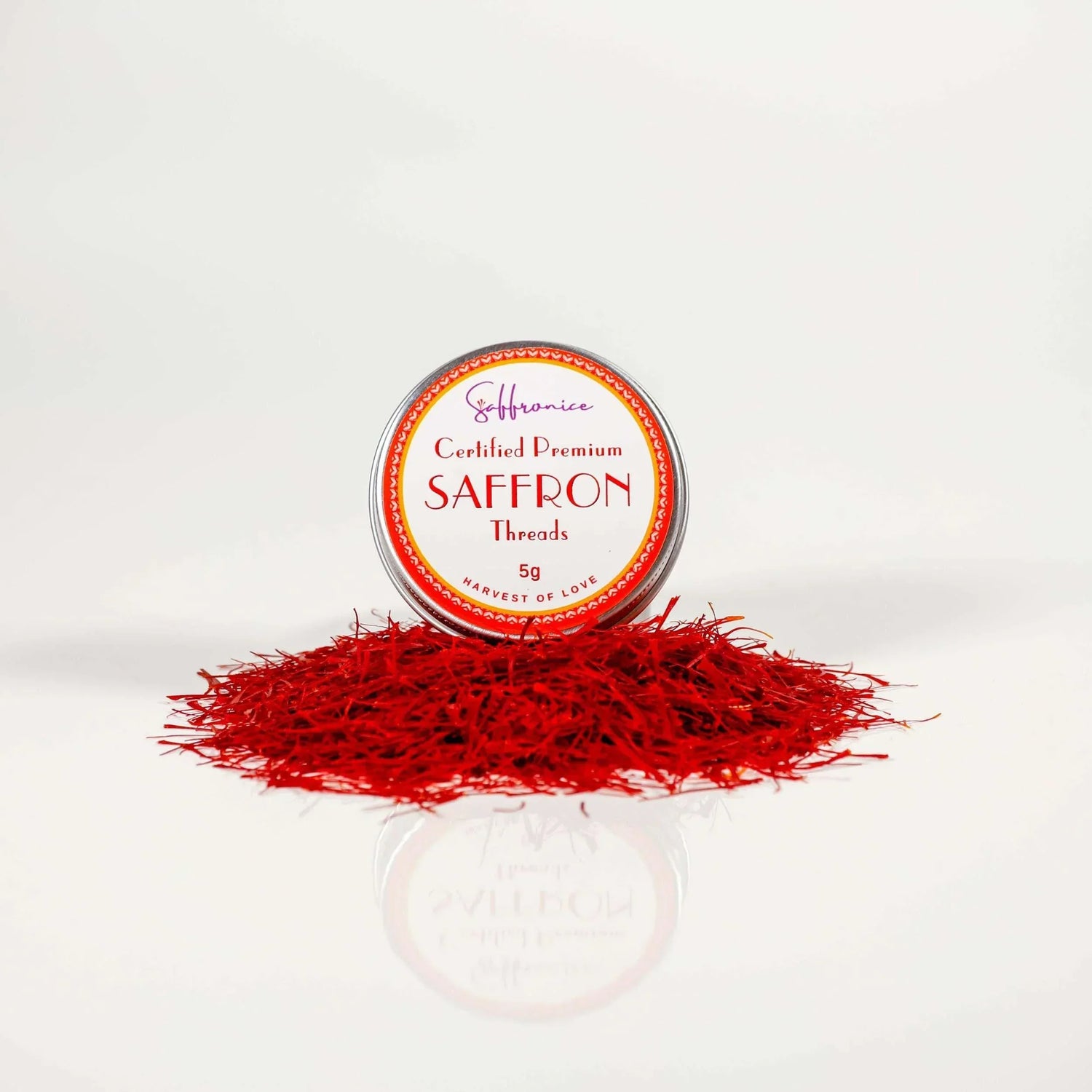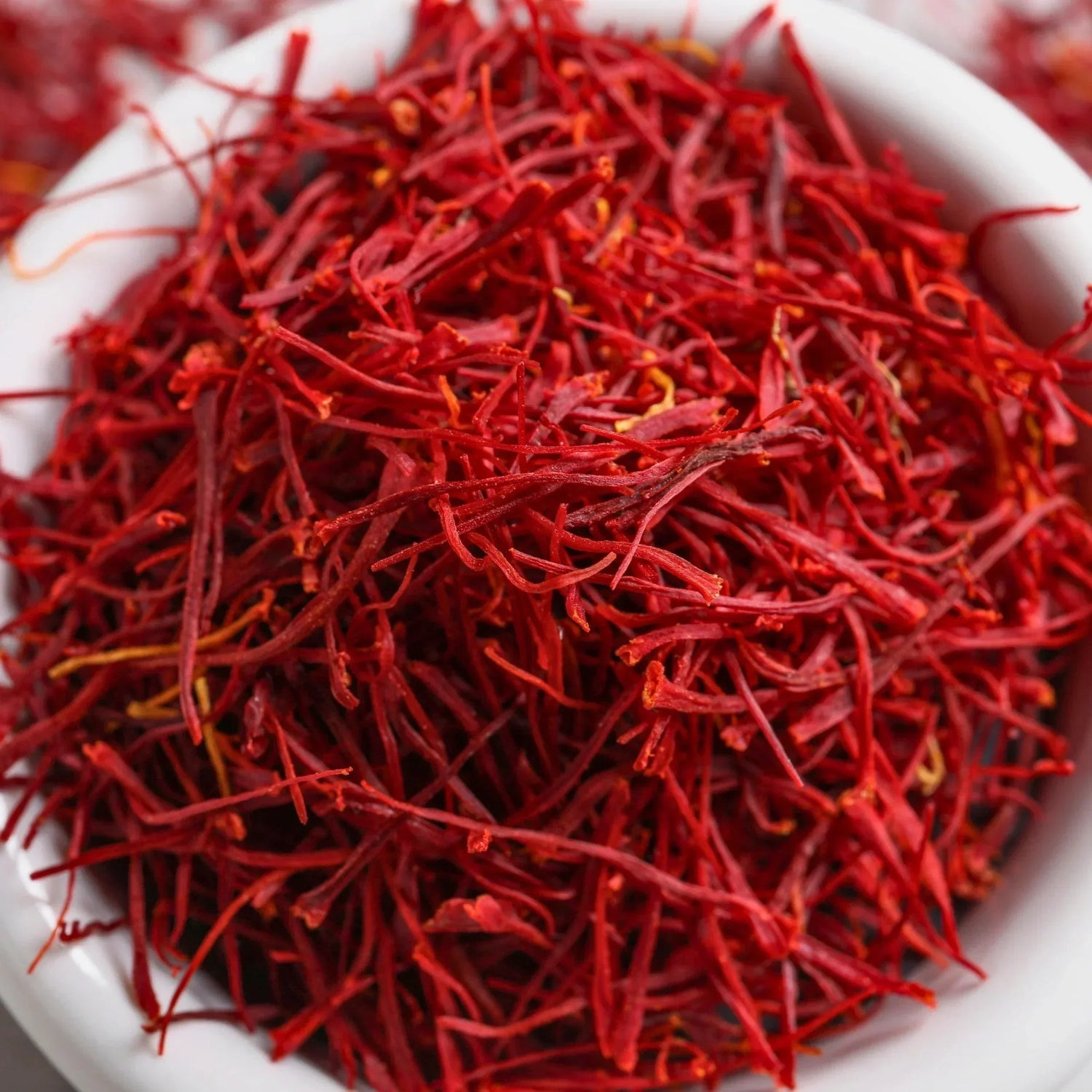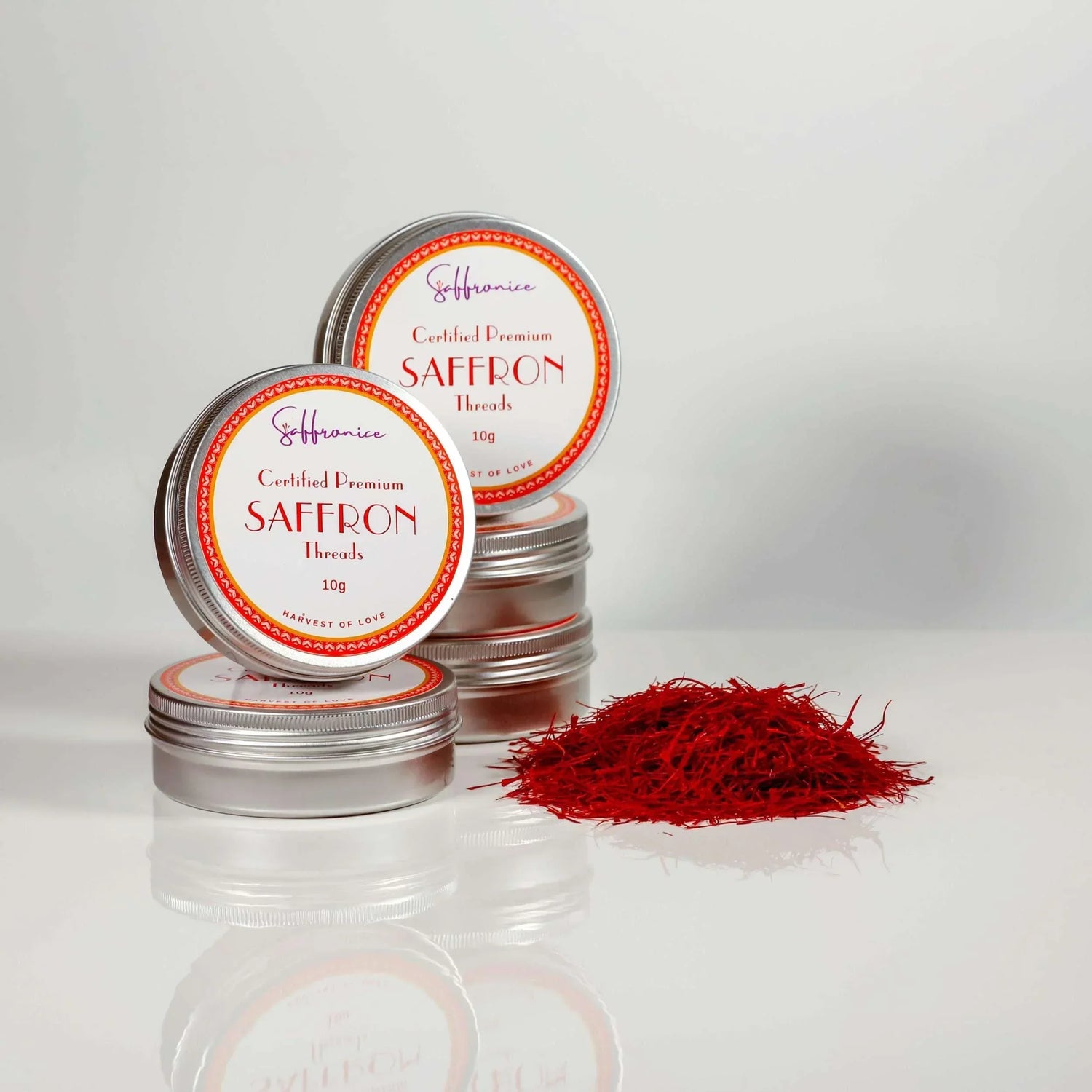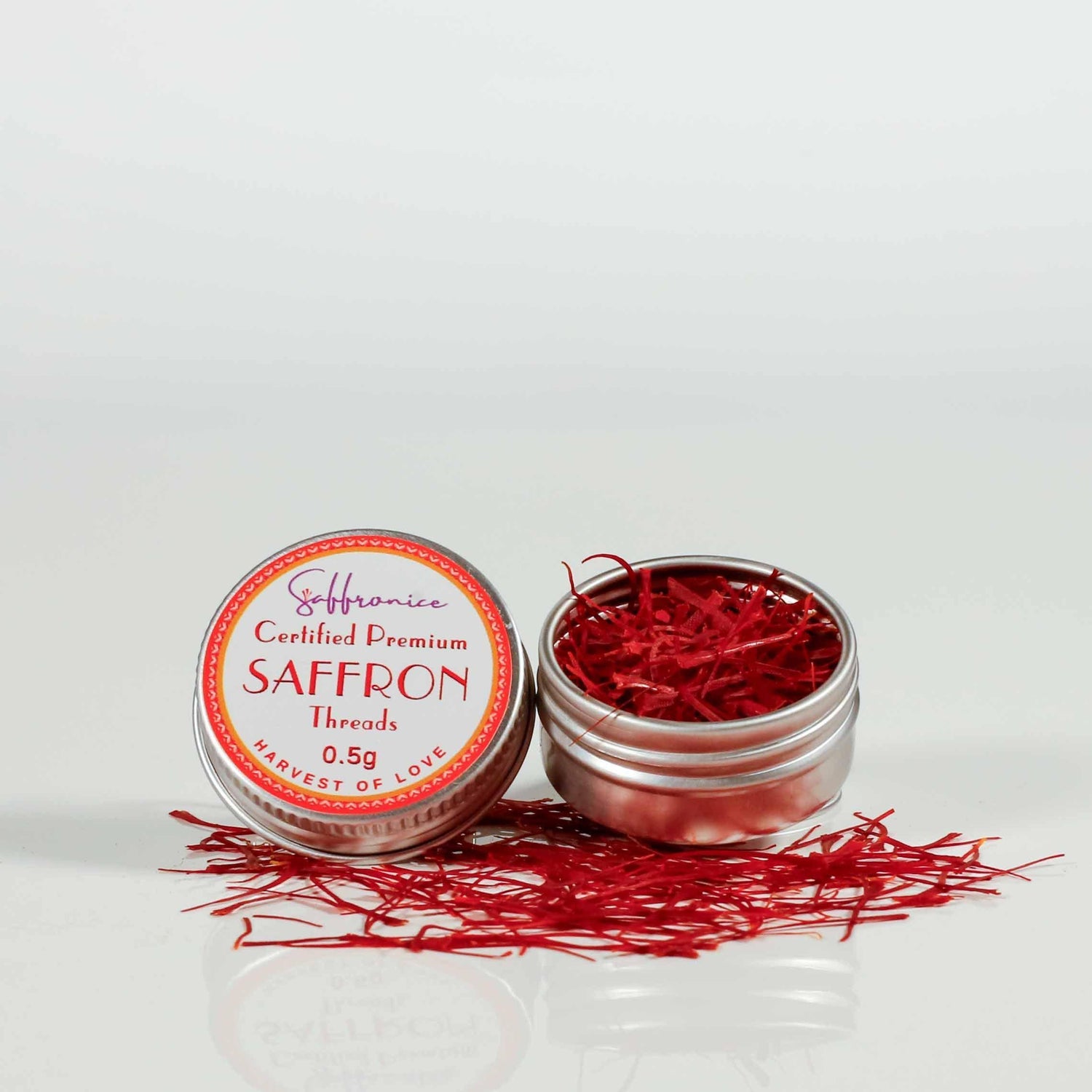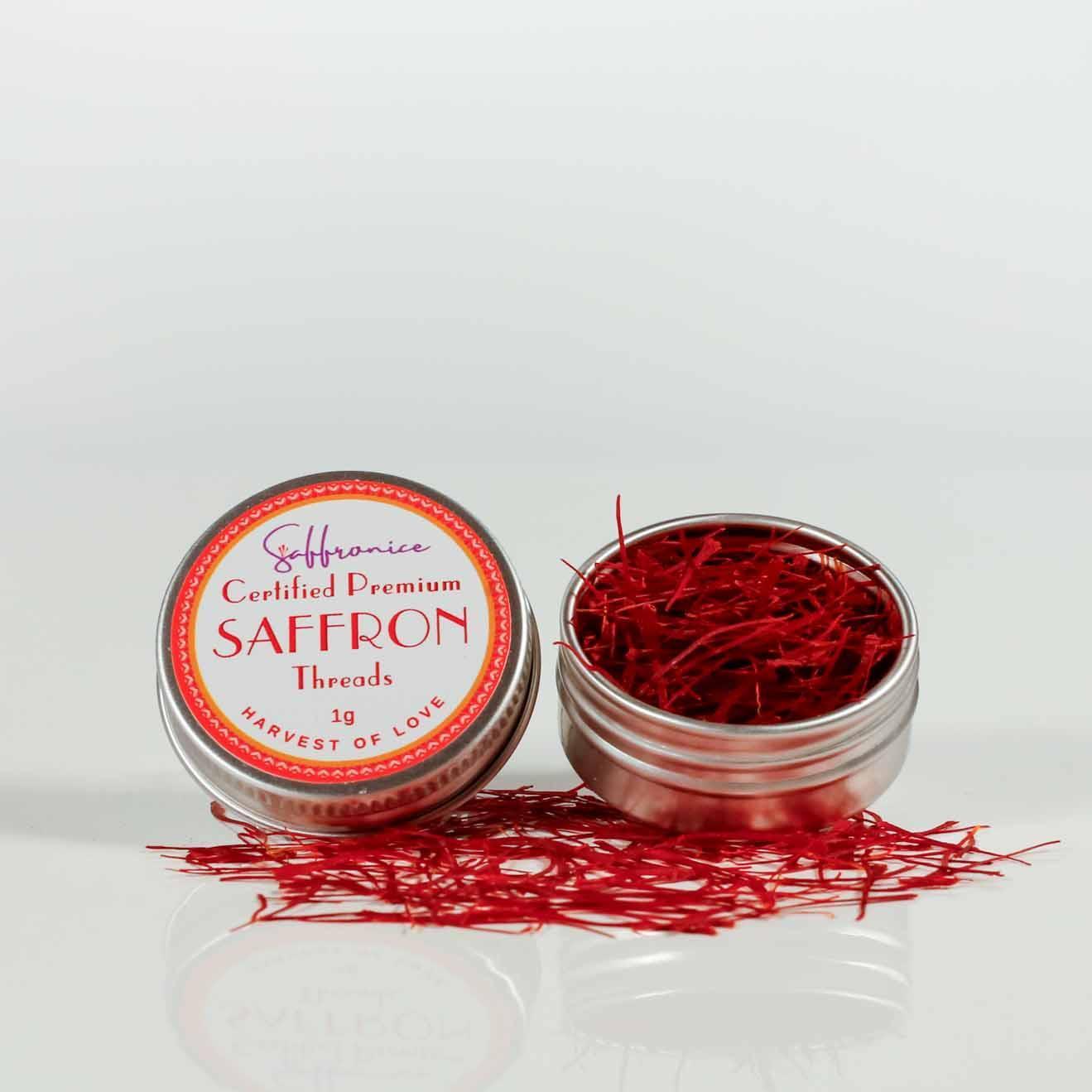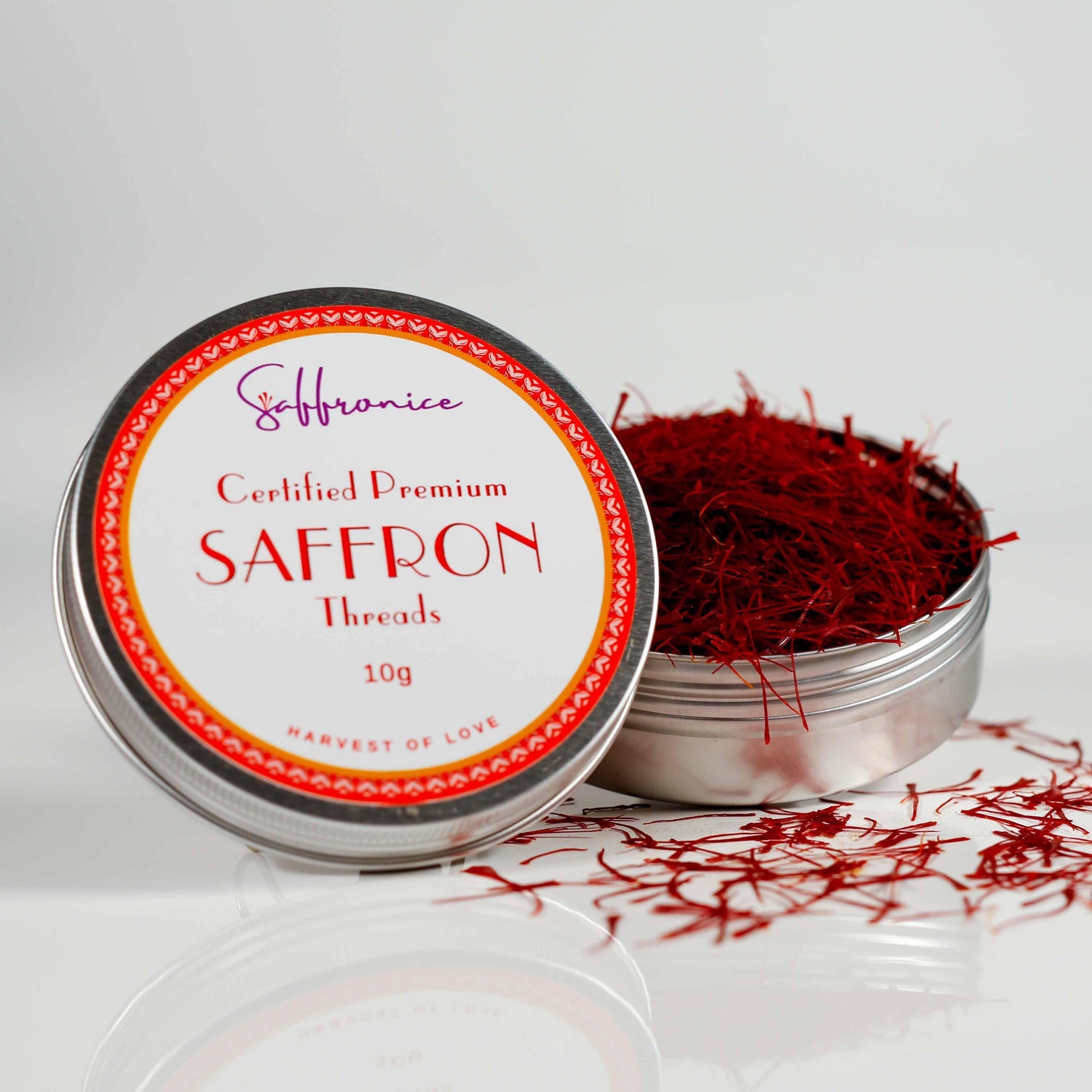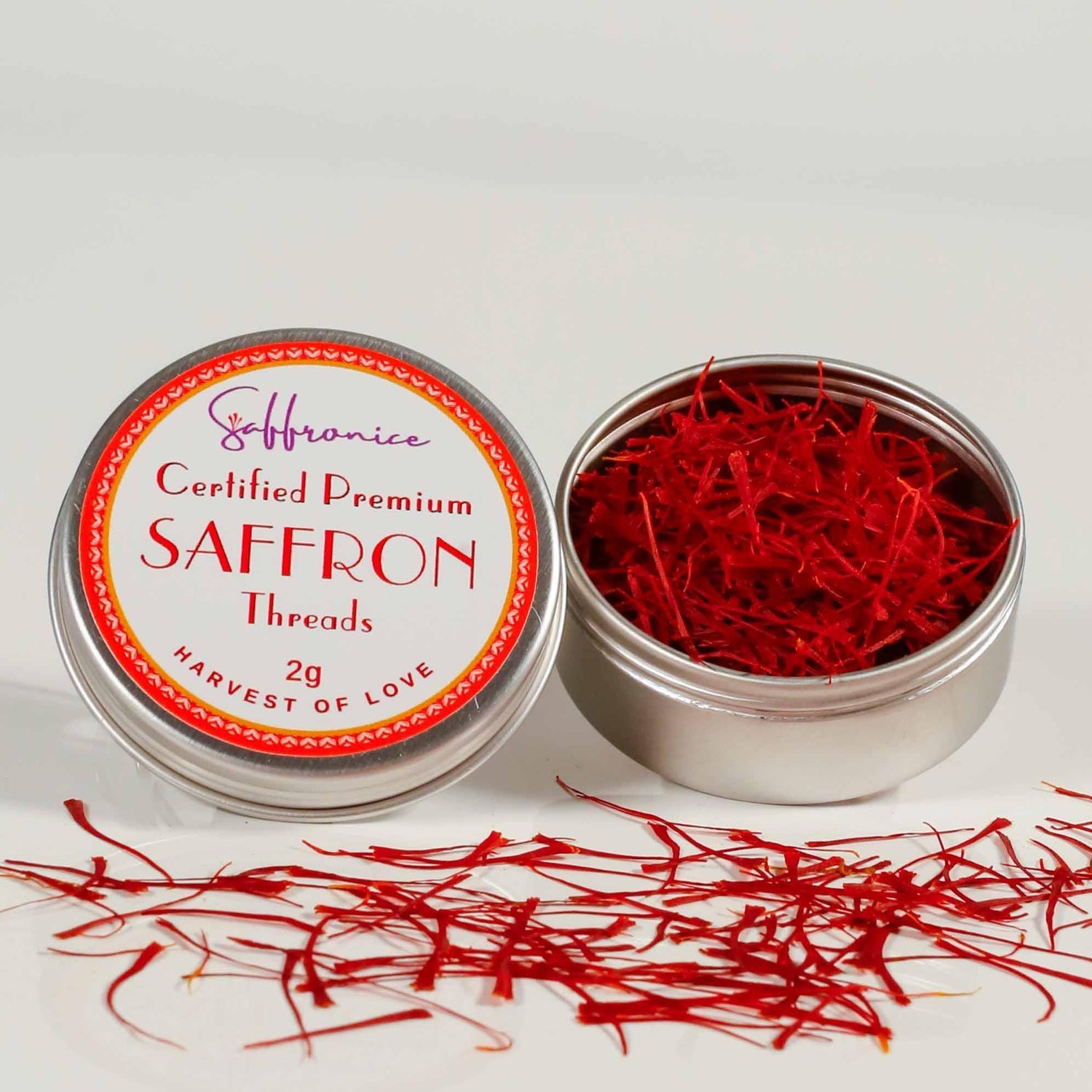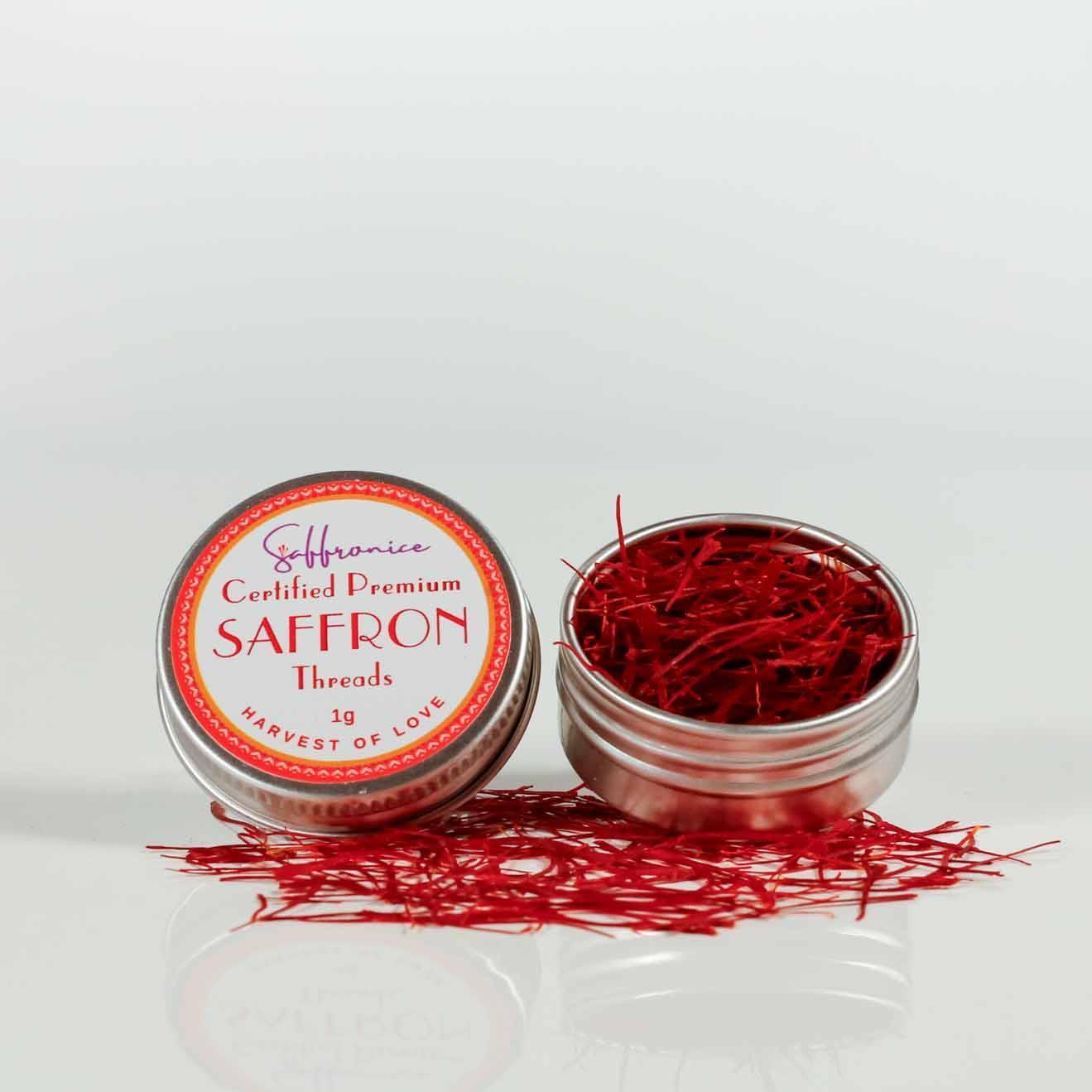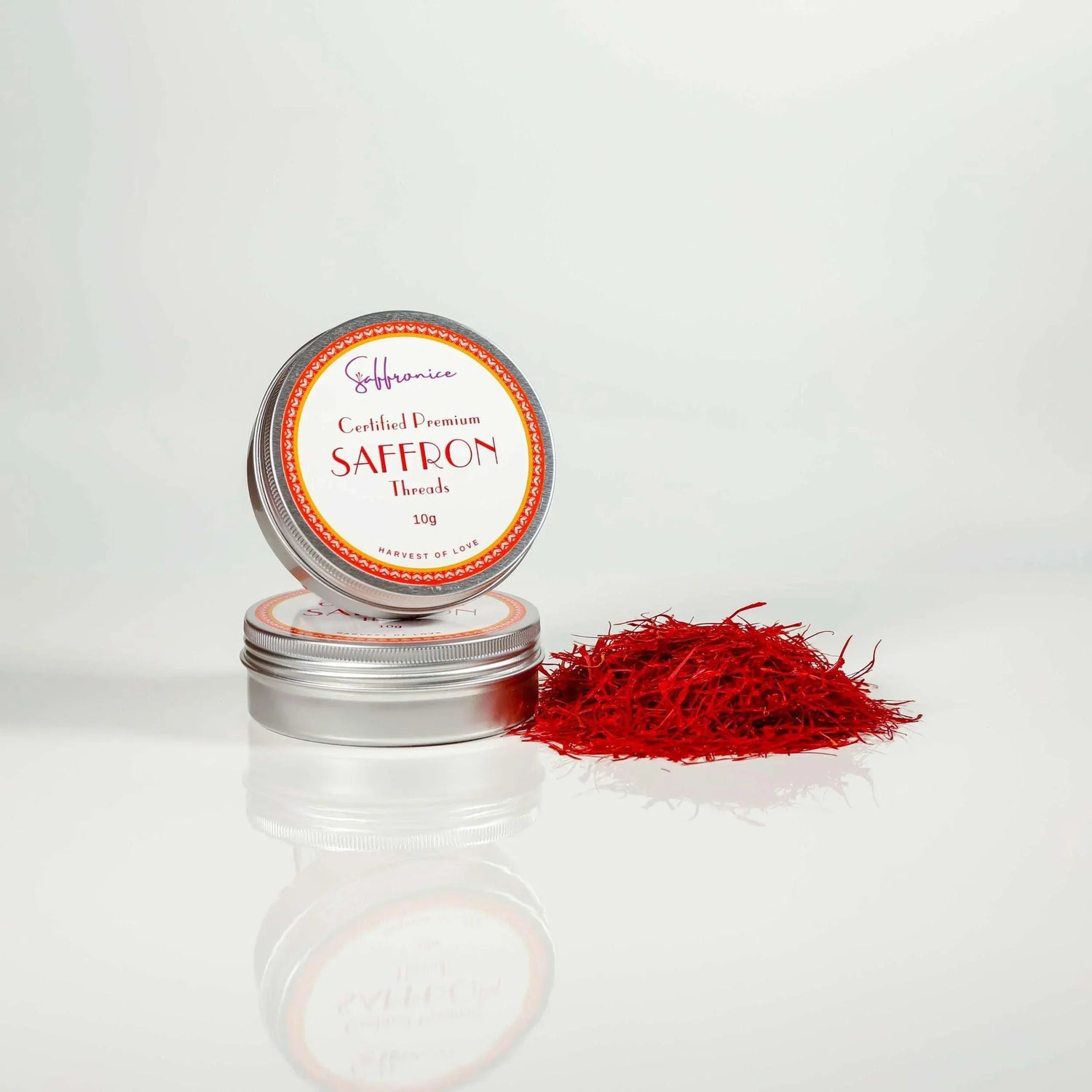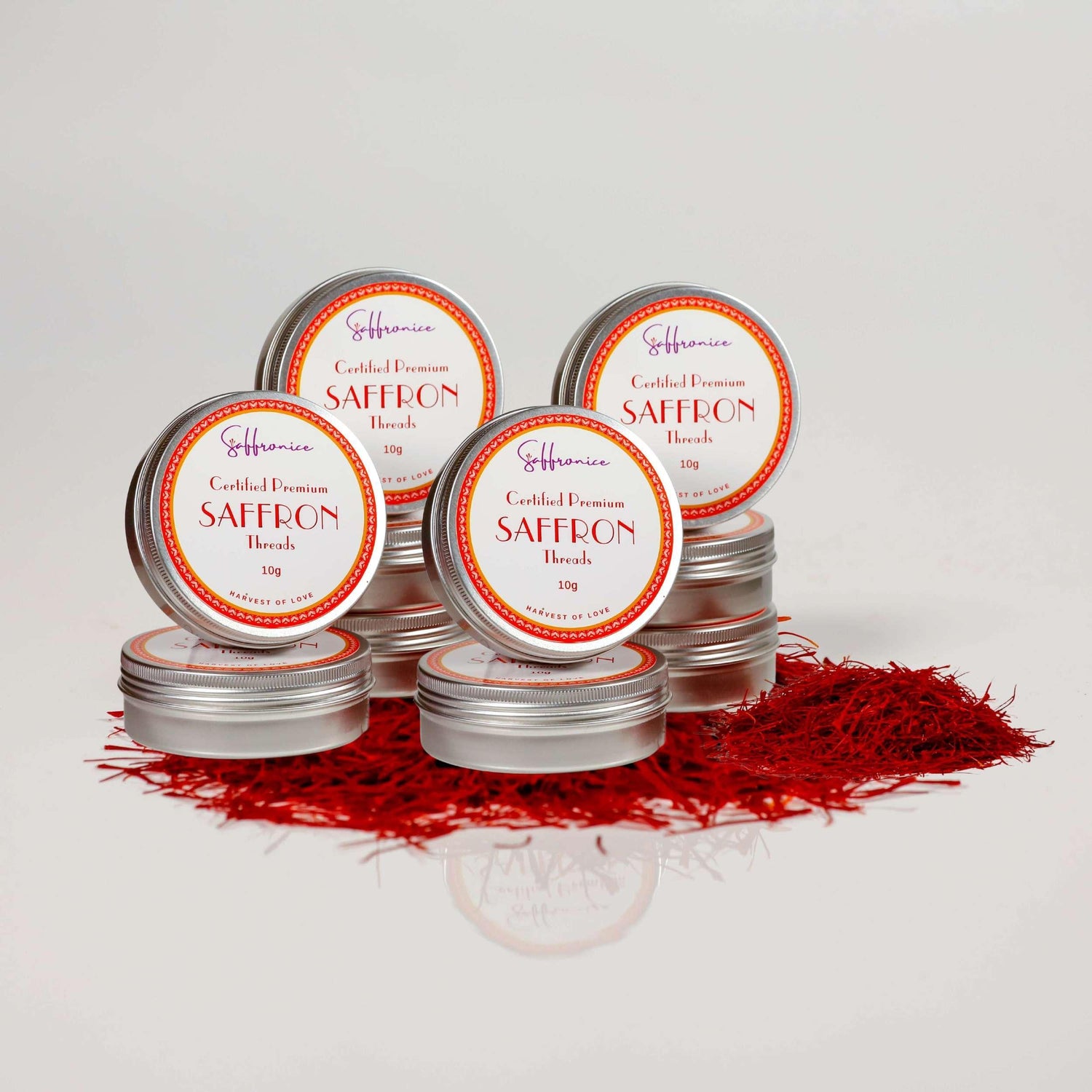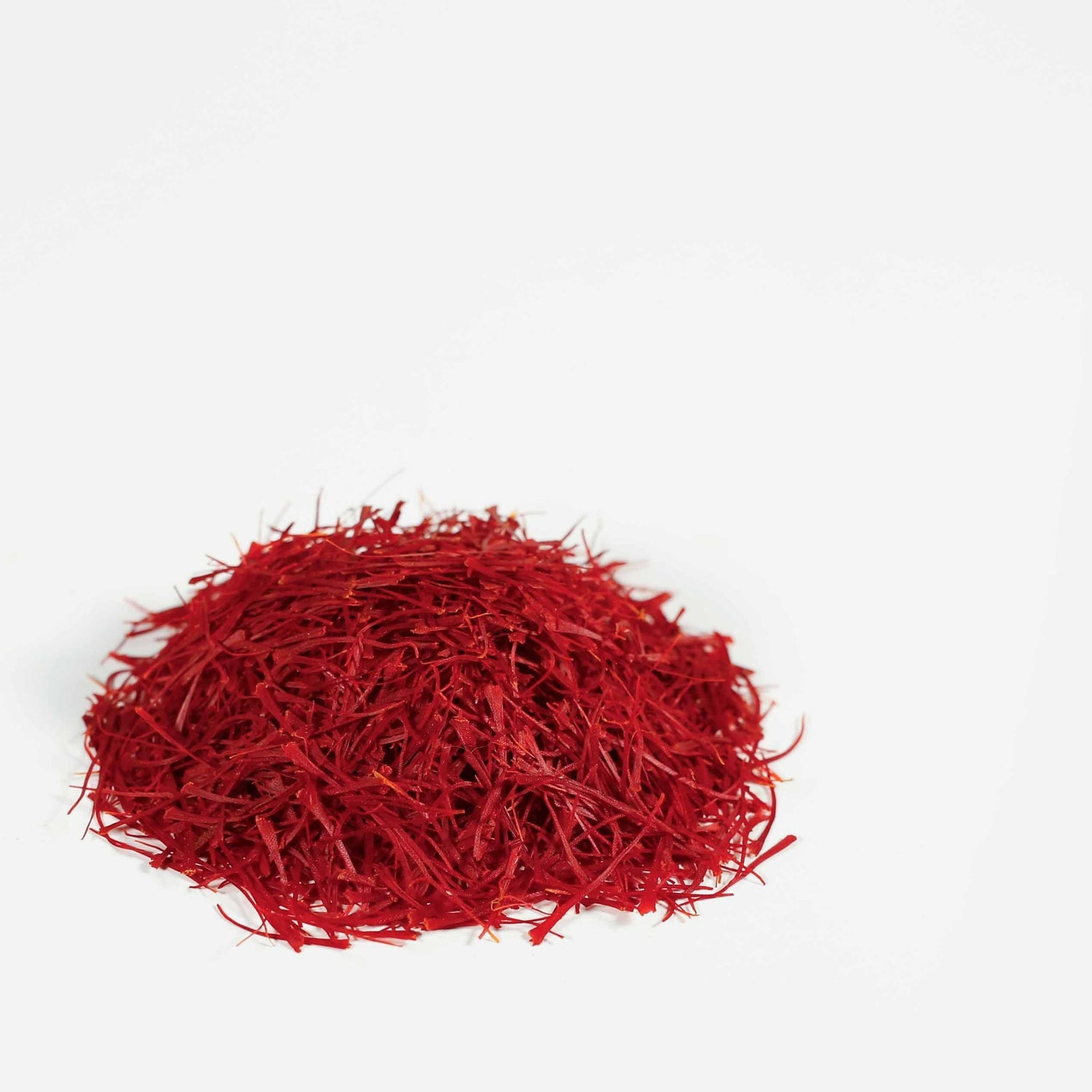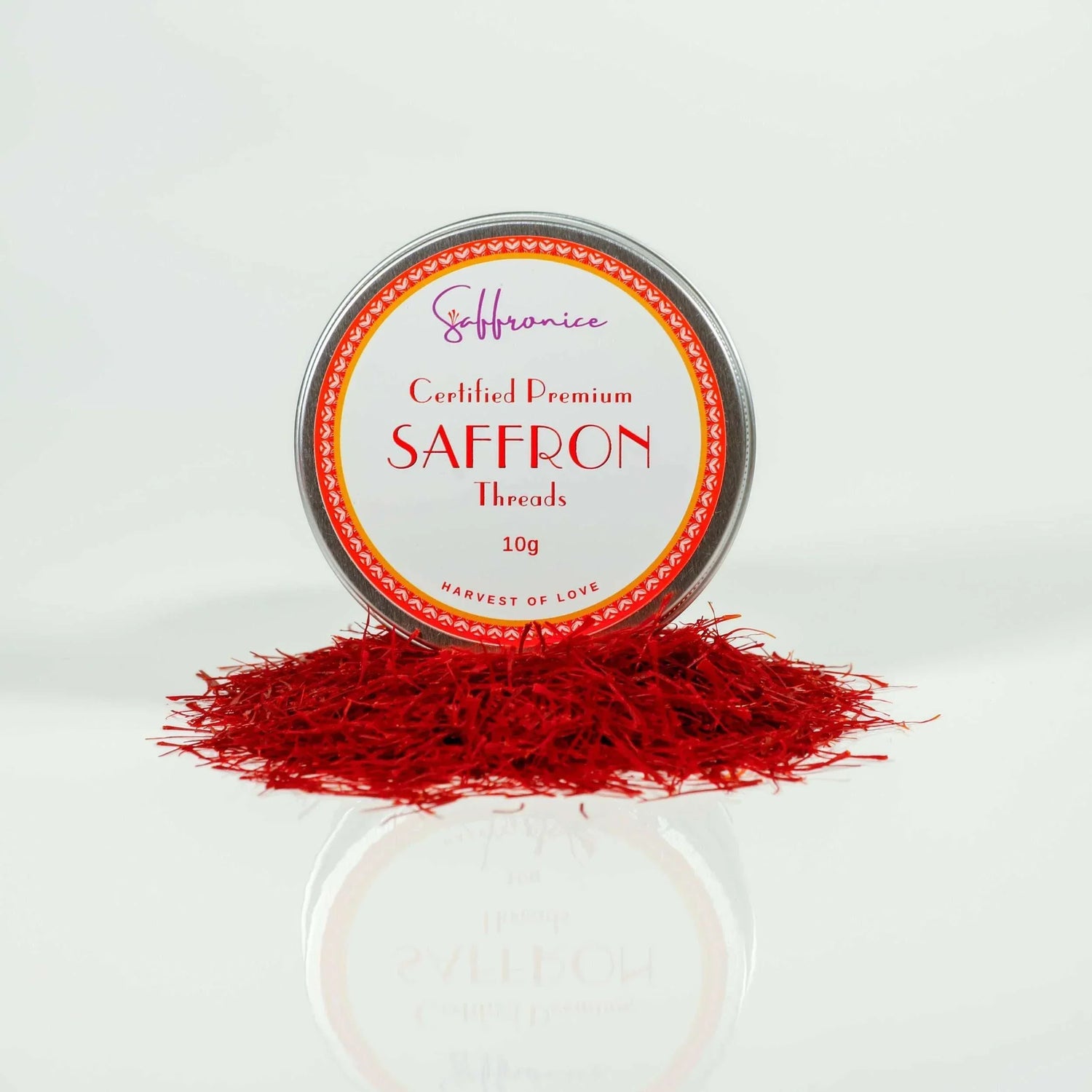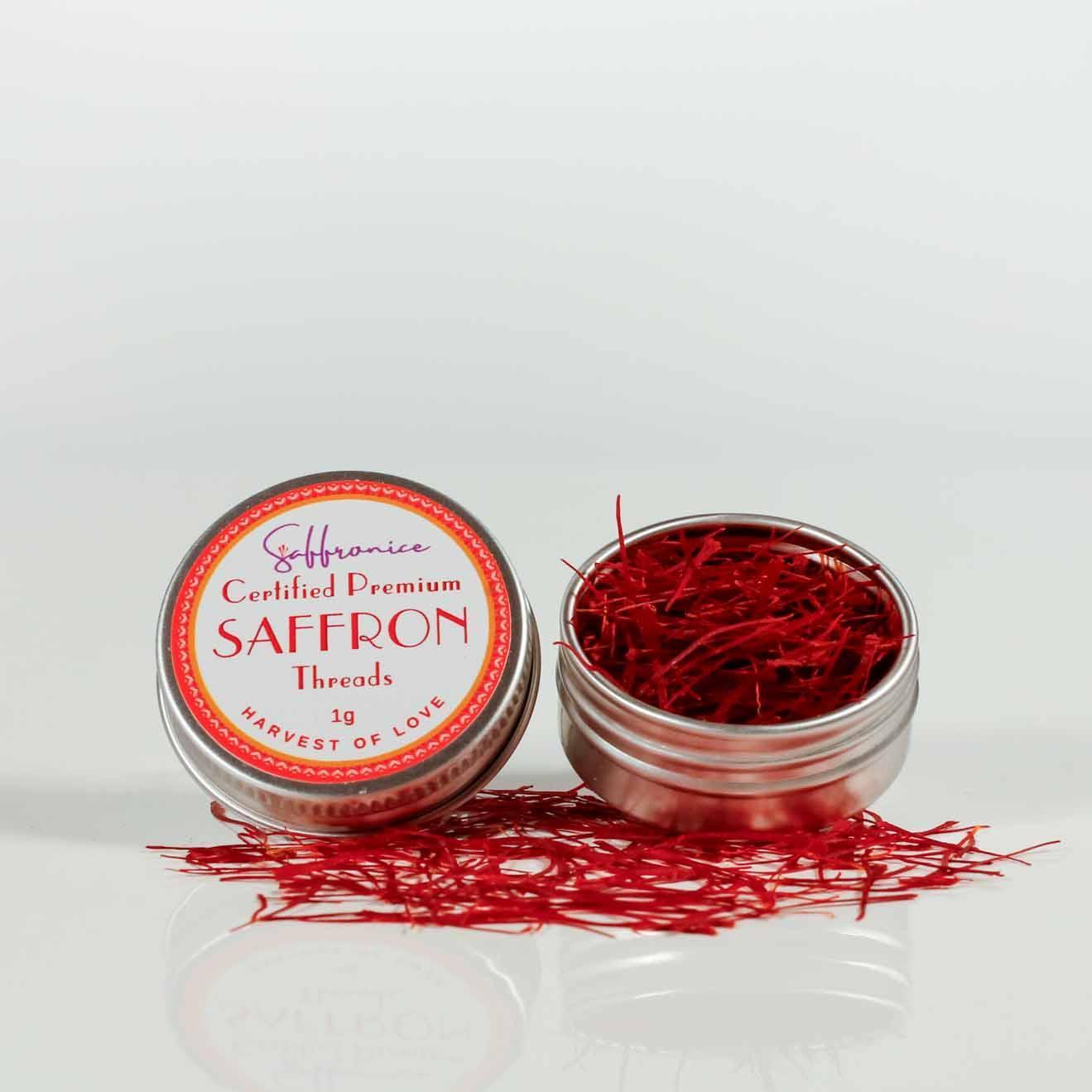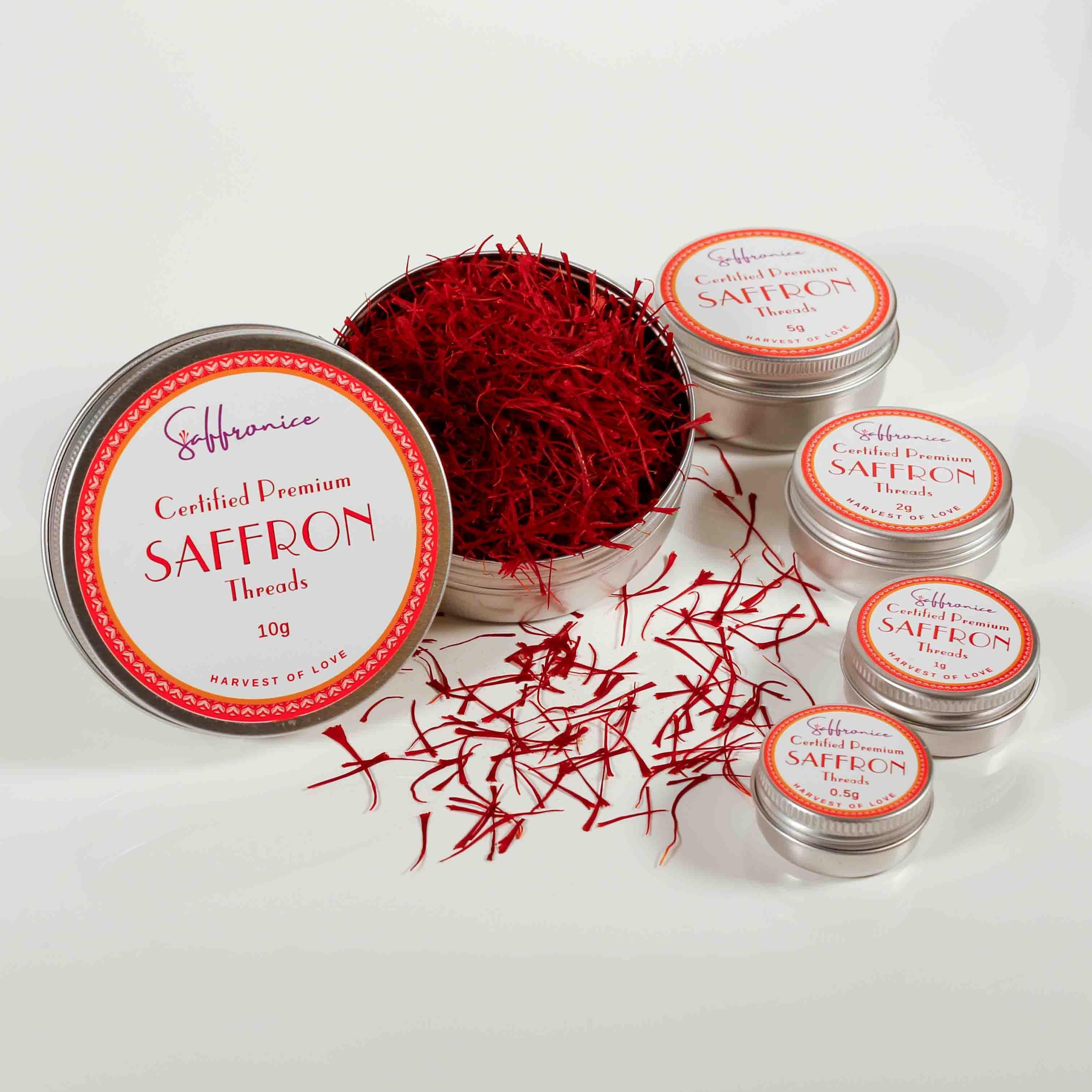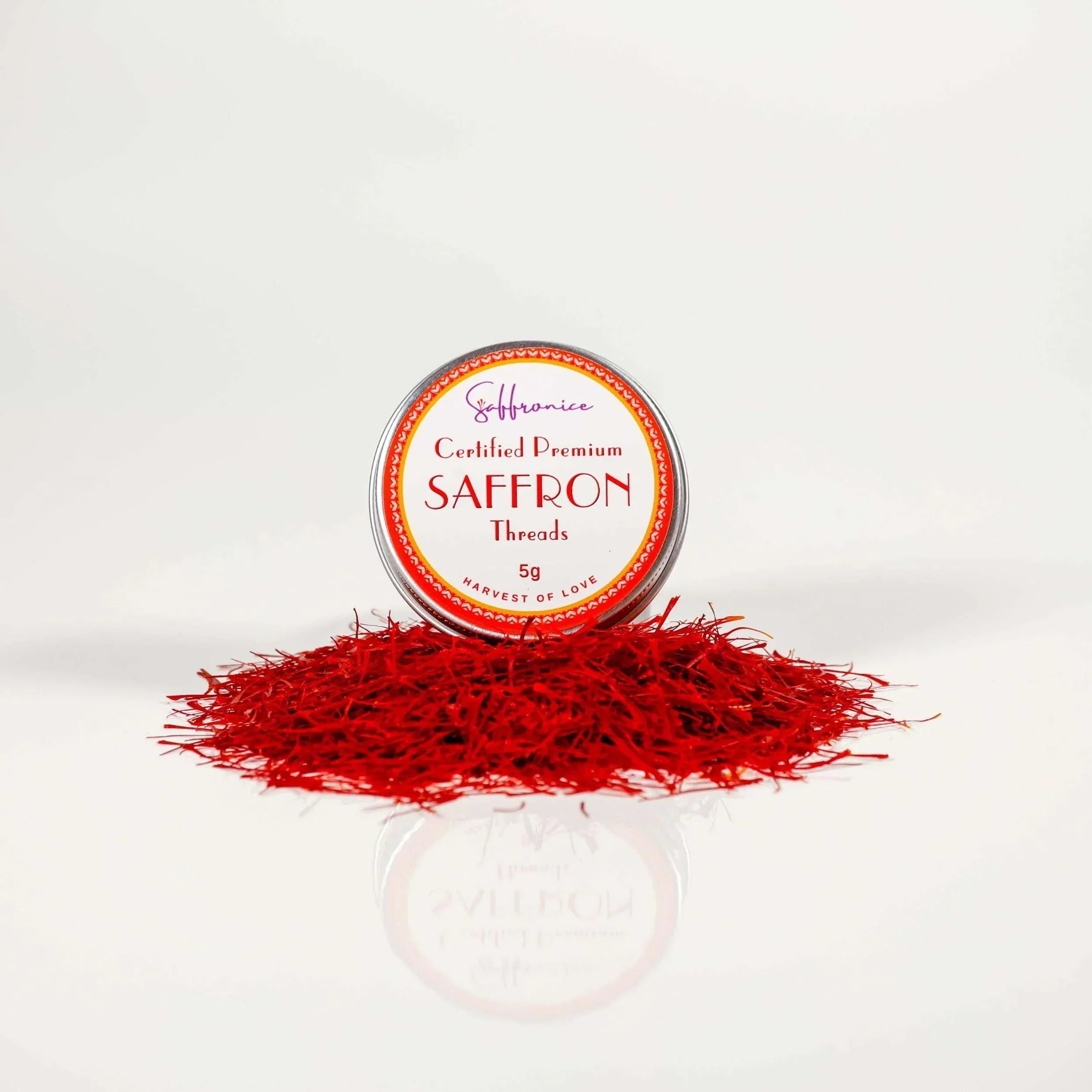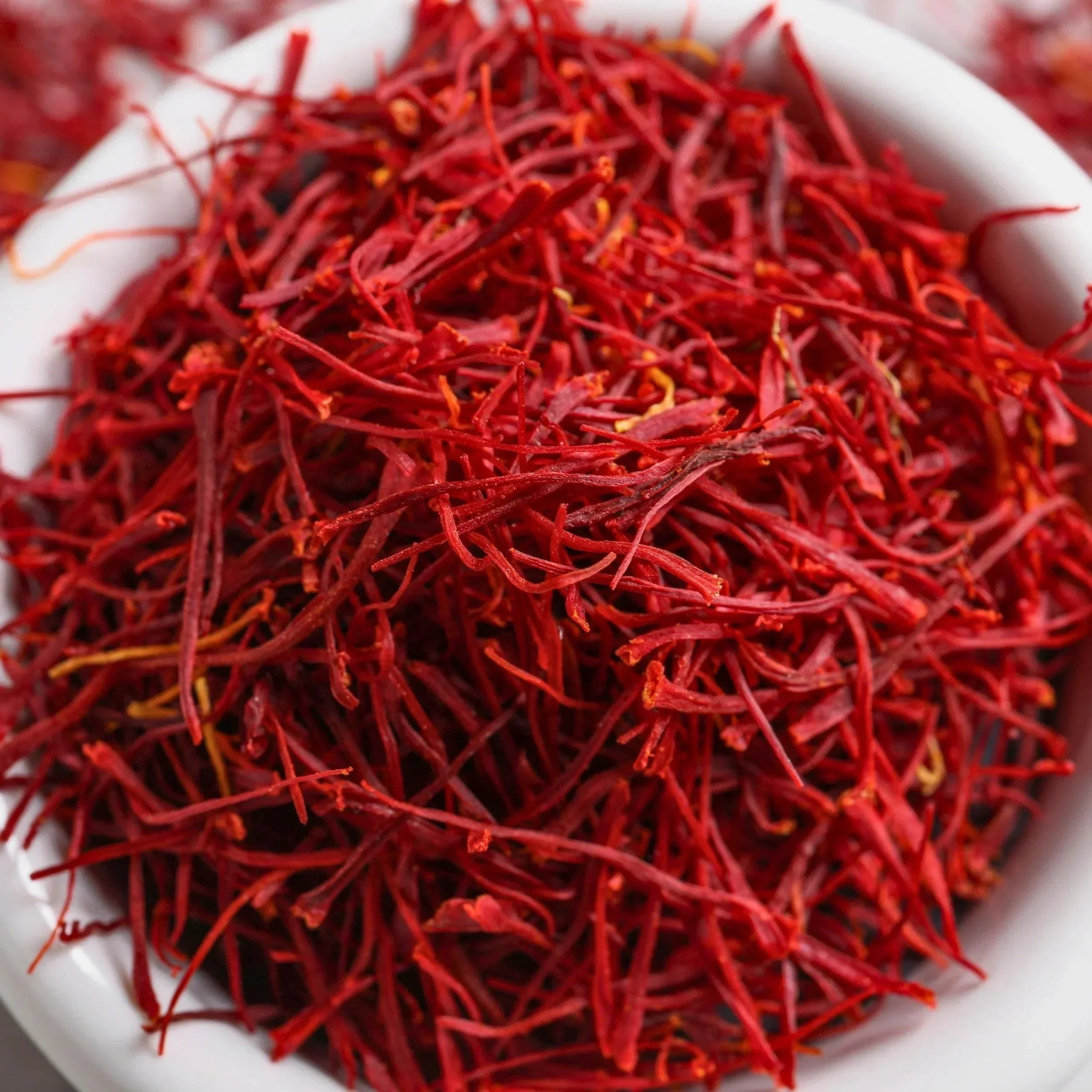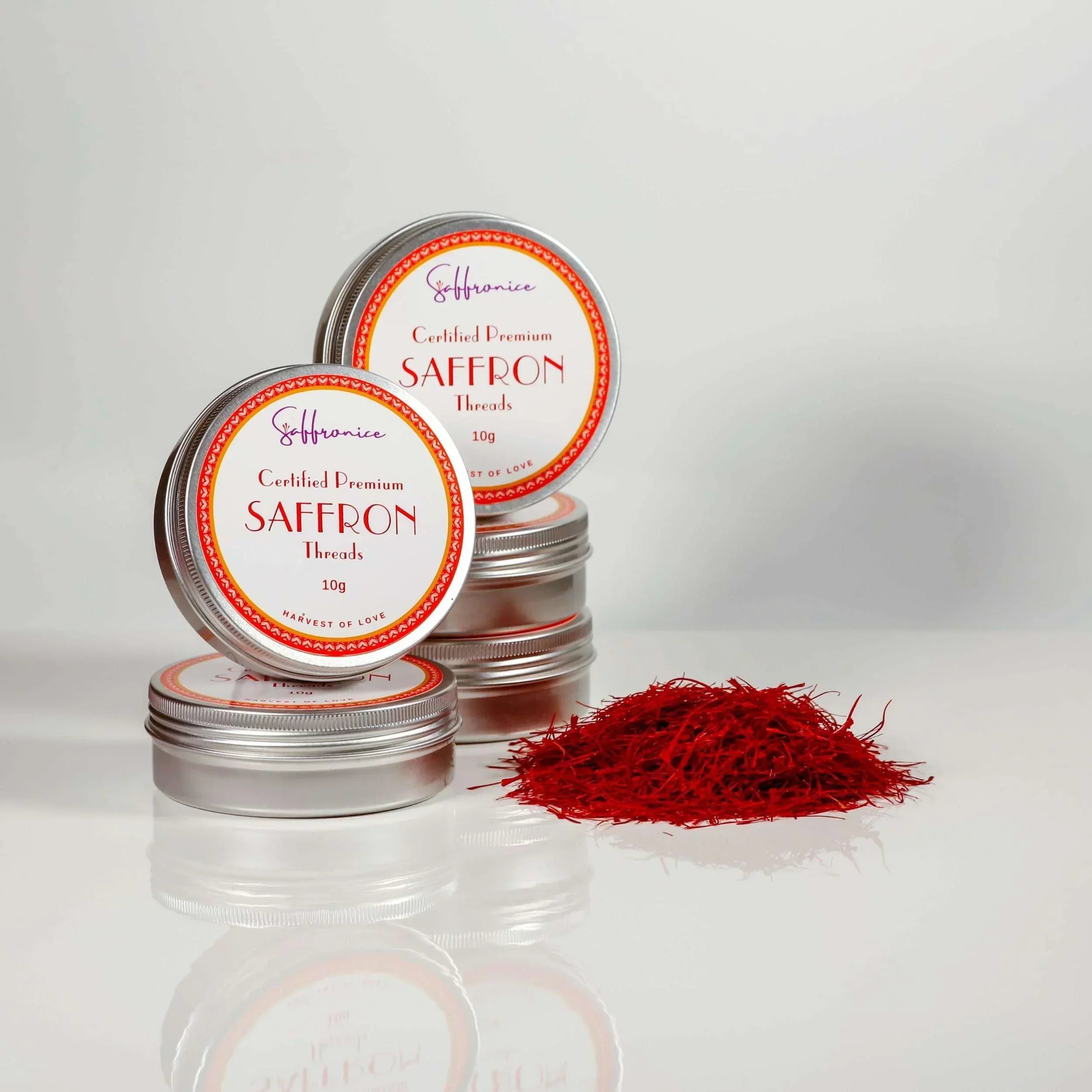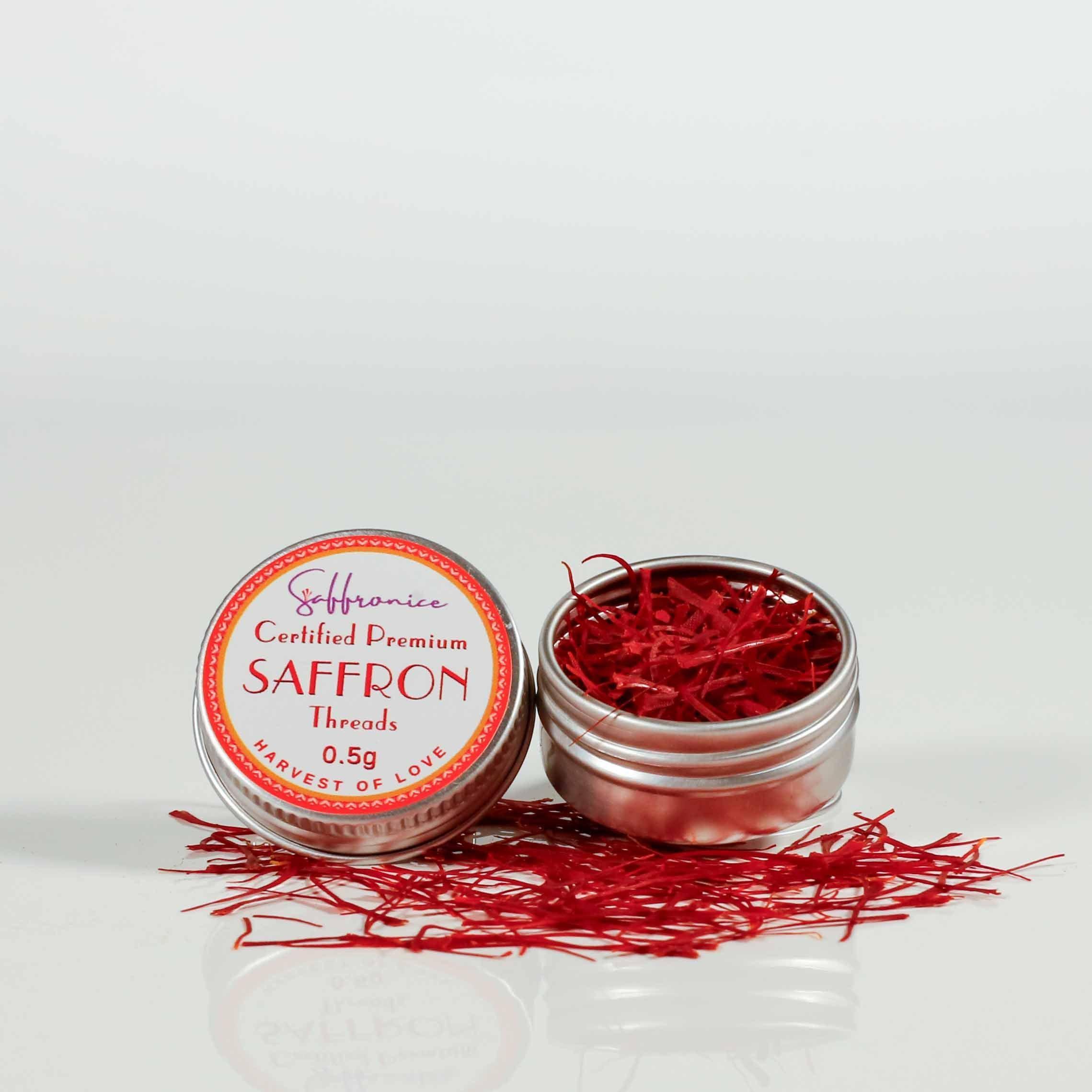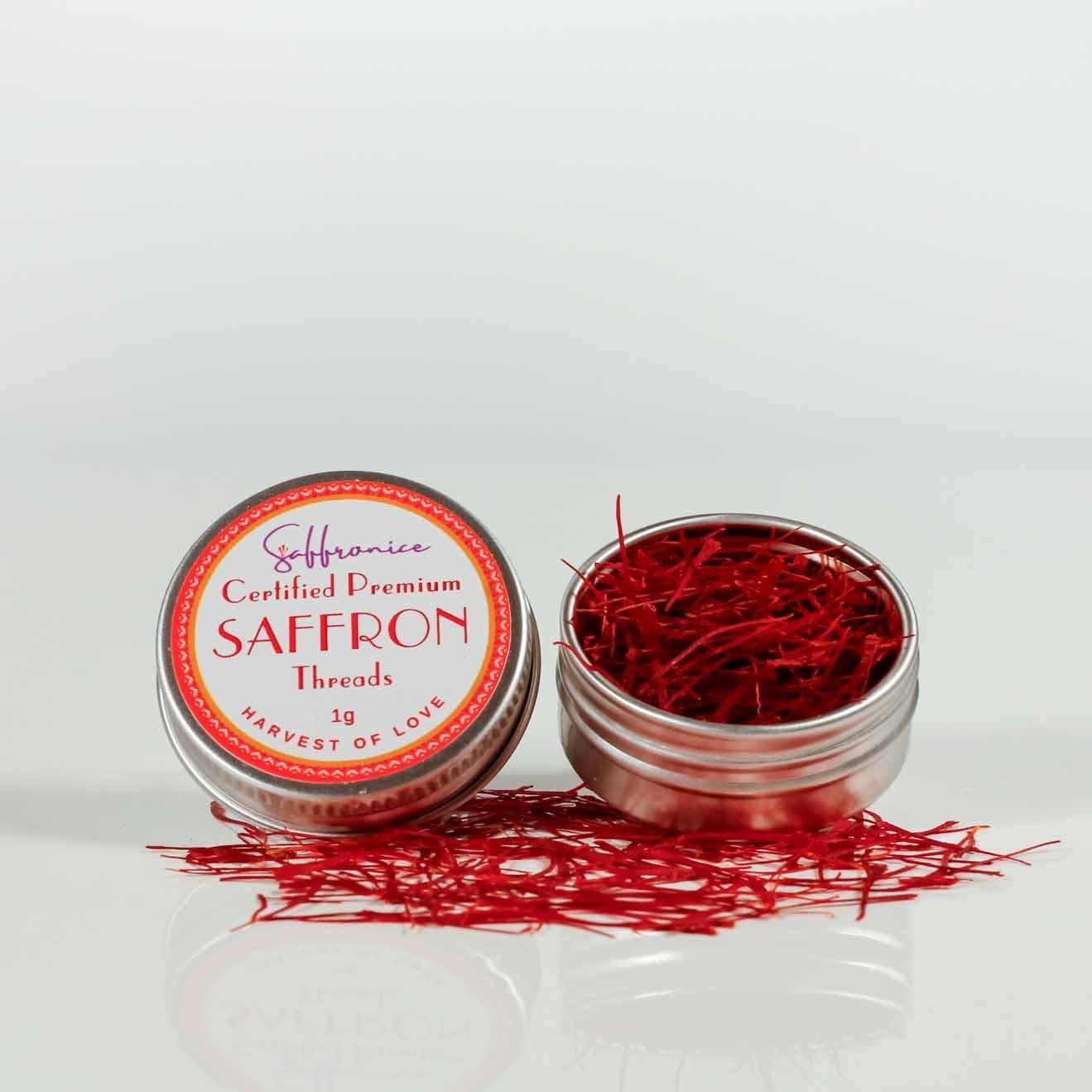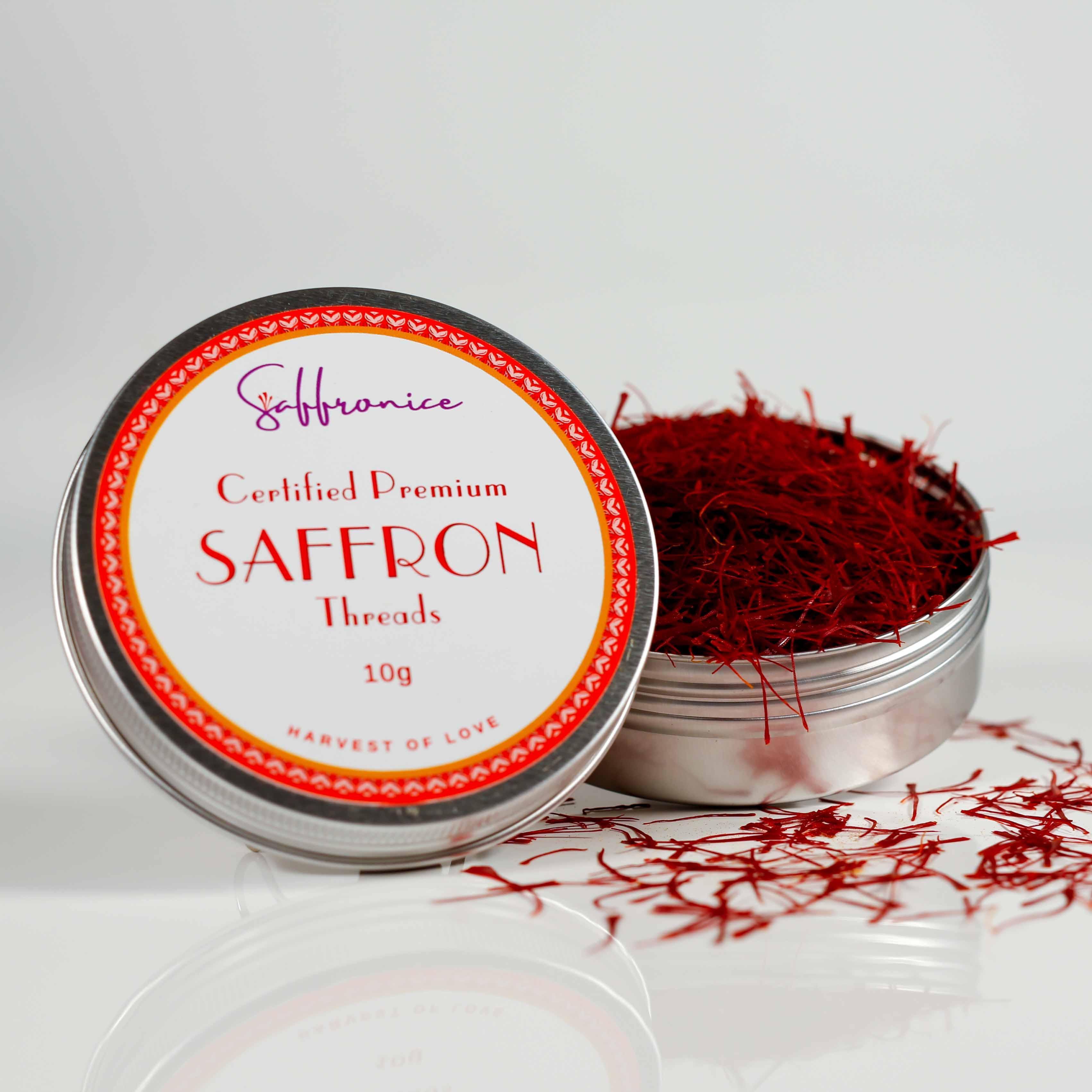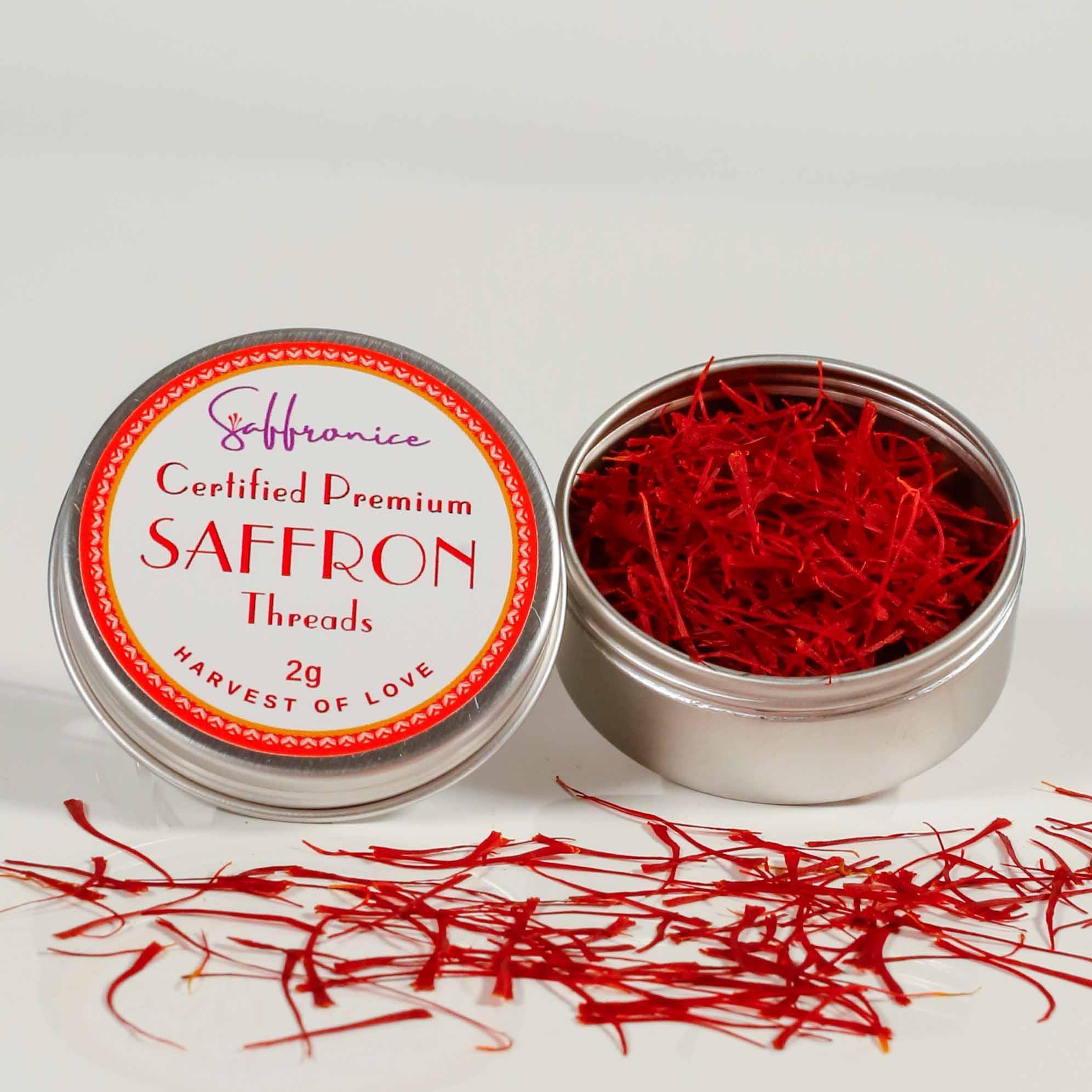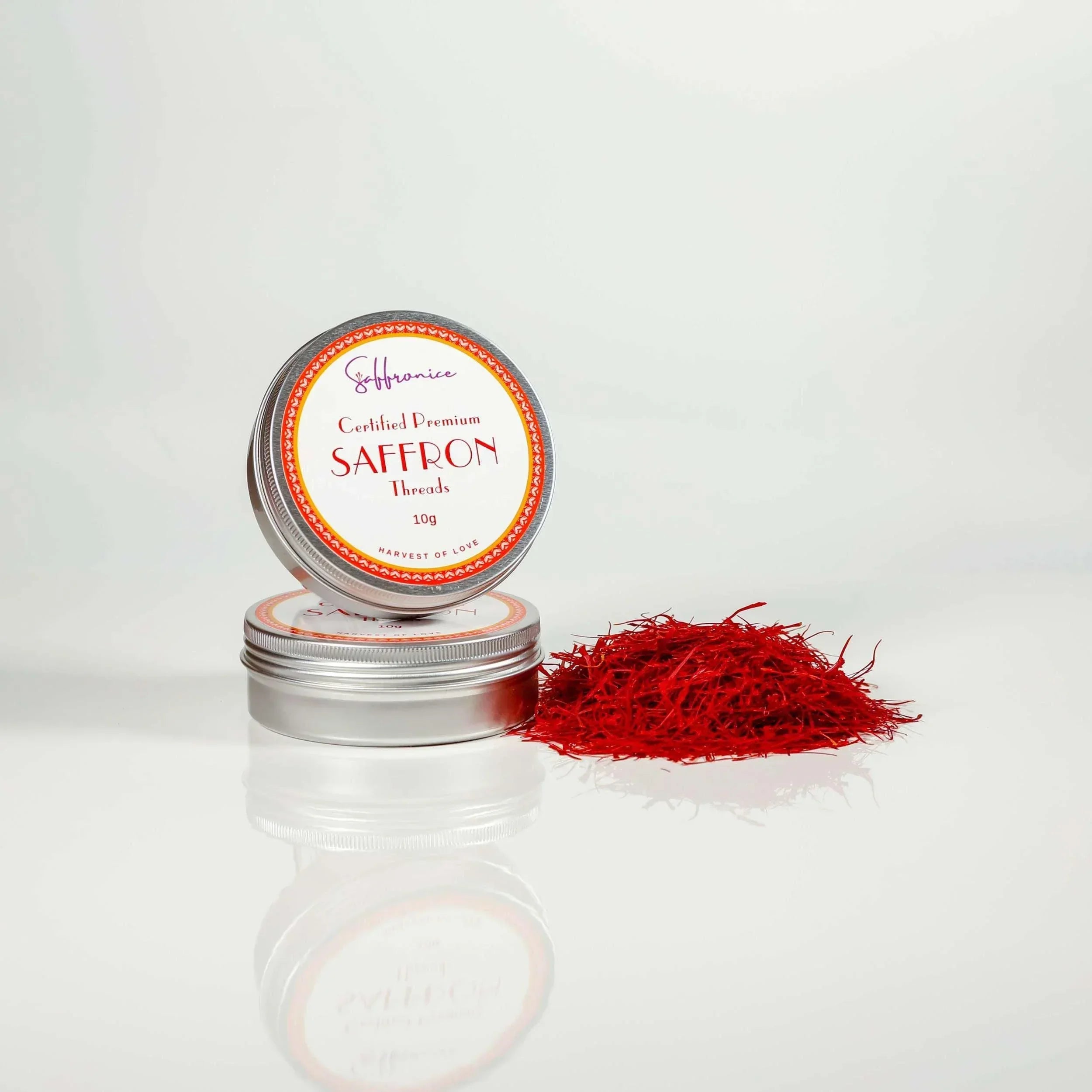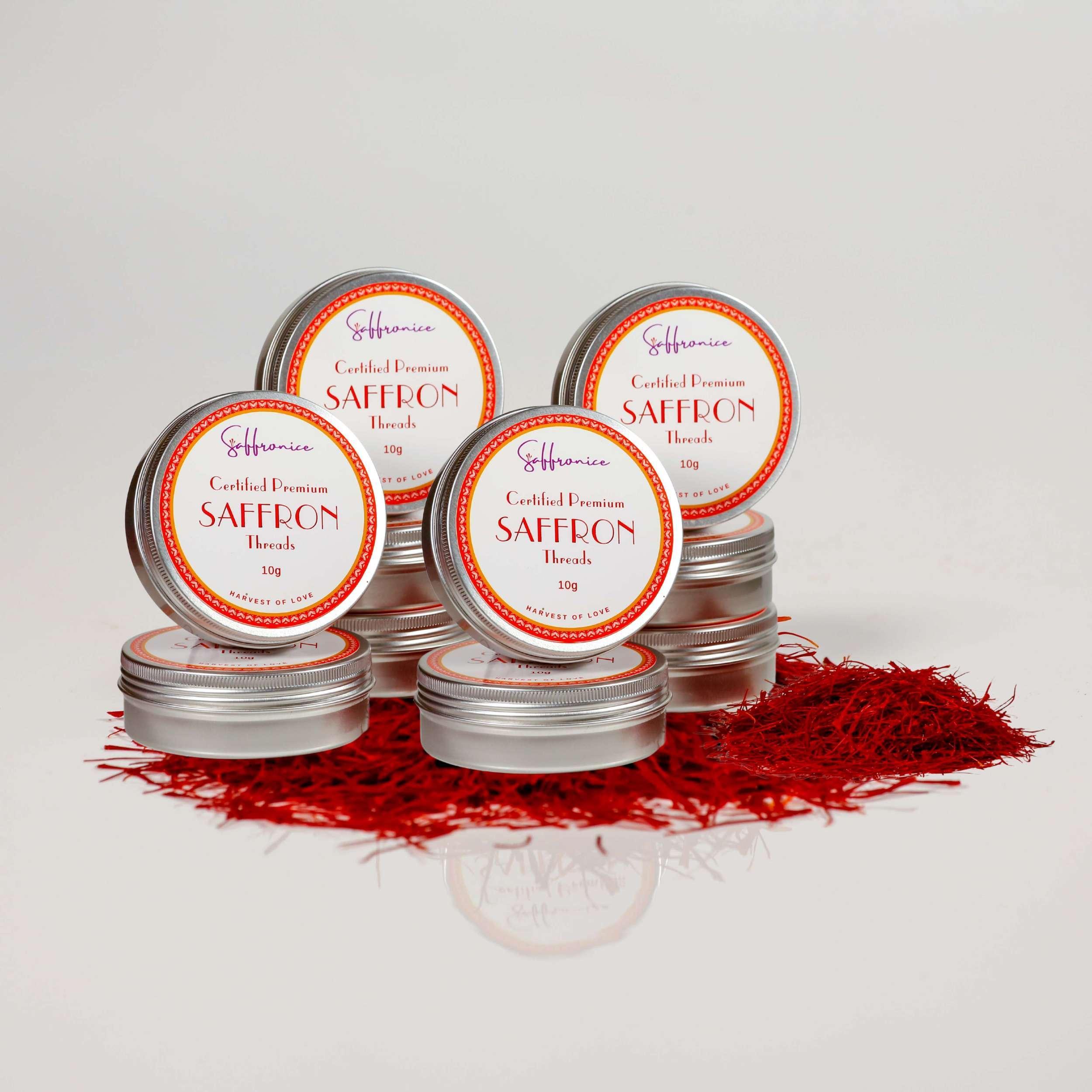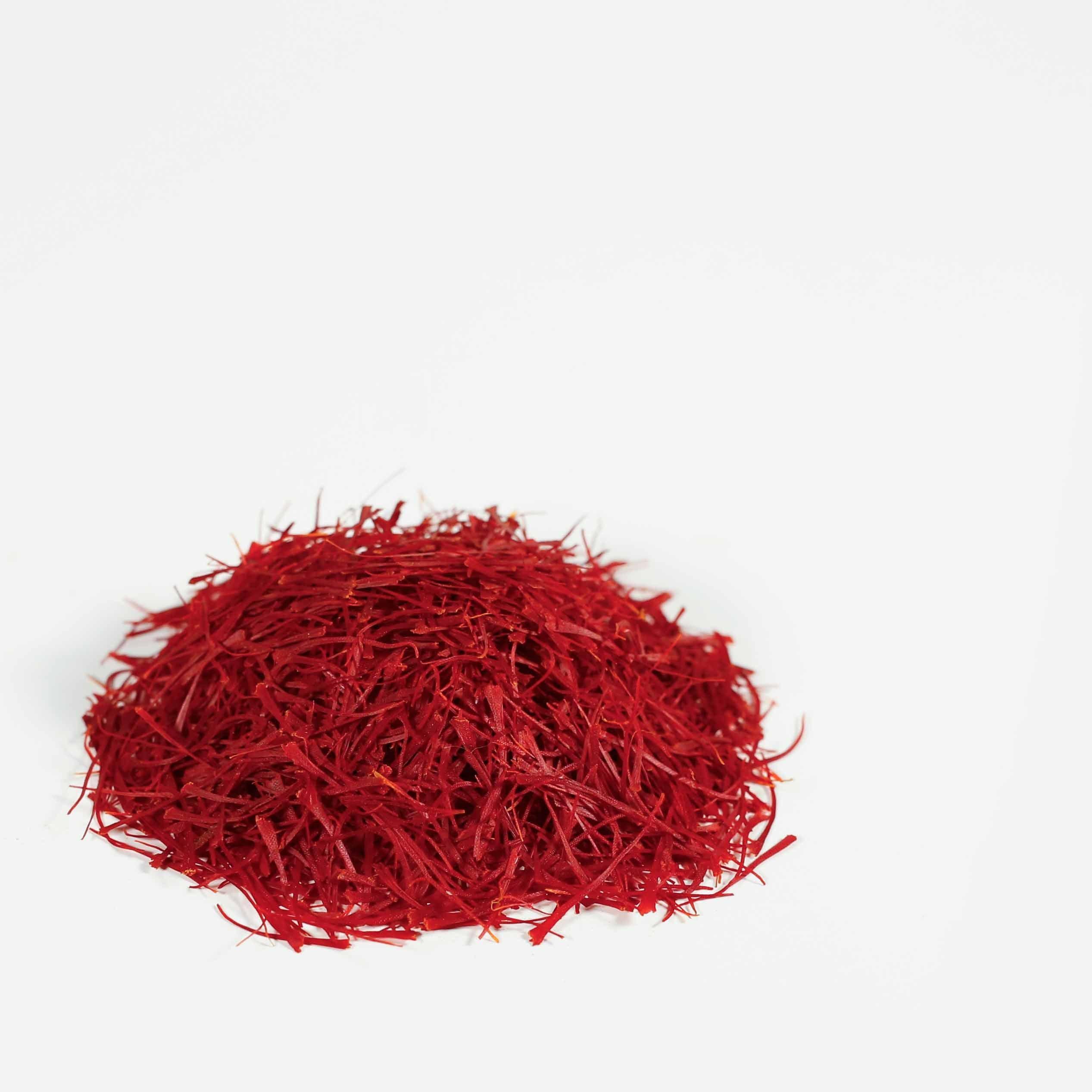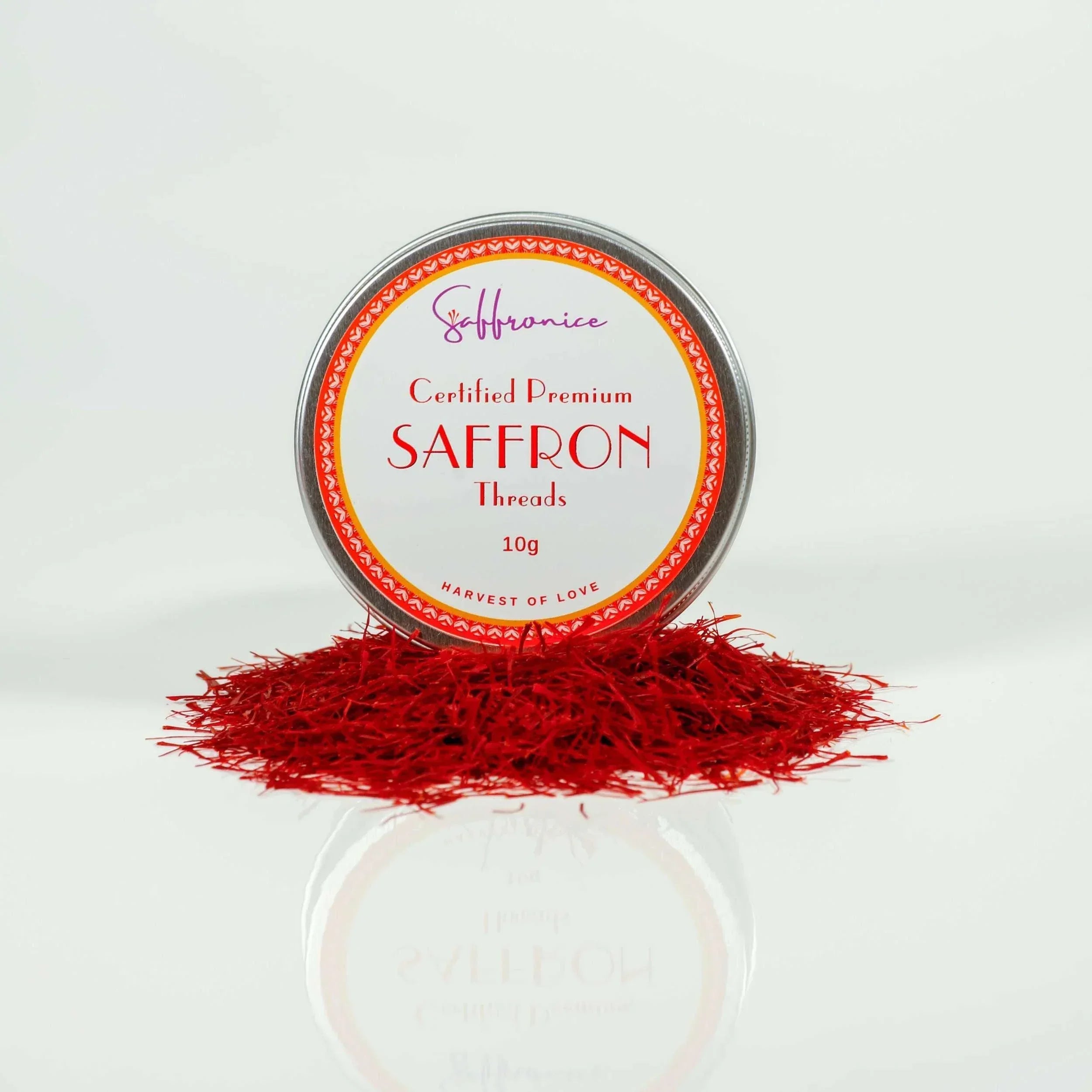Welcome to a world where lavishness meets custom, and the secret to glowing skin lies in the threads of a delicate flower. Let's journey with saffron, one of the world's most cherished spices.
A Pinch of History in Every Strand:
Saffron, often revered as the king of spices, has a history as vibrant as its colour. This exotic spice, derived from the stigmas of the Crocus sativus flower, has been a symbol of wealth and elegance for centuries. Used by ancient civilisations from the Greeks to the Egyptians, it was a culinary delight and a key ingredient in their beauty rituals. Cleopatra, famed for her exquisite beauty, is said to have bathed in saffron-infused waters. But what makes this spice so unique, and why is it still relevant in our modern-day skincare routines?
A Rising Star in Skincare:
Fast forward to today, and saffron is making a grand entry into skincare. No longer just a kitchen staple, it's now celebrated for its remarkable skin-enhancing properties. But why are beauty aficionados and skincare experts around the globe turning to this ancient spice? It's simple: saffron is packed with antioxidants and bioactive compounds that promise a host of benefits for the skin. From fighting off signs of aging to giving you that sought-after natural glow, saffron is proving to be a powerhouse in skincare.
Unveiling the Saffron Magic:
This article will delve into the heart of Saffron's allure. We'll explore the myriad benefits it offers for your skin, how to incorporate it into your skincare regime, and even share some simple yet luxurious recipes you can whip up at home. Whether you're a skincare enthusiast or just curious about this golden spice, there's something here for everyone. So, are you ready to discover the saffron advantage and elevate your skincare game?
The Rich Heritage of Saffron in Skincare

As we delve into the world of saffron, it's essential to appreciate its rich heritage, deeply rooted in ancient beauty rituals and time-honoured traditions. This chapter aims to transport you back in time to understand Saffron's prestigious legacy and unravel the science behind its modern-day allure in skincare.
A Timeless Treasure in Beauty Regimens:
Saffron's journey as a beauty enhancer is as old as time itself. Using saffron for cosmetic purposes dates back to old cultures such as the Greeks, Romans, and Egyptians. It was a prized ingredient in their beauty concoctions, believed to impart a radiant glow and improve skin texture. In historical texts, we find references to saffron being used in royal baths, facial ointments, and as a natural colouring agent, highlighting its versatility and revered status.
The Persians, known for their detailed herbal knowledge, utilised saffron in various skin treatments, acknowledging its soothing and rejuvenating properties. It symbolised luxury and a testament to their understanding of herbal remedies and natural skincare solutions.
Unravelling the Science of Saffron's Skin Benefits:
Fast forward to the present, and the allure of saffron in skincare remains undiminished, now backed by scientific research. Saffron's magic lies in its bioactive compounds, primarily crocin, crocetin, and Safranal. These compounds are potent antioxidants, fighting off the free radicals that cause premature ageing and skin damage.
Crocin, the compound that gives saffron its characteristic golden colour, is known for its anti-inflammatory and skin-brightening properties. It helps reduce pigmentation, even out skin tone, and add a natural brightness to the skin.
Crocetin, another critical compound, aids in enhancing skin texture and firmness. It's believed to promote skin elasticity, thereby reducing the visual aspect of fine lines, giving the skin a more youthful look.
With its antioxidant and antiseptic qualities, Safranal contributes to skin health by protecting against environmental pollutants and reducing oxidative stress.
In essence, saffron is a relic of the past and a beacon of natural skincare, offering many timeless and relevant benefits. As we move forward, we'll explore how this golden spice can be integrated into contemporary skincare practices, allowing us to bask in its age-old glory and therapeutic benefits.
Unveiling the Benefits of Saffron for Skin

Embarking on a deeper exploration of saffron, we discover this esteemed spice is more than a culinary delight. Its profound impact on skin health is rooted in many benefits, primarily due to its potent antioxidant and anti-inflammatory properties.
The Antioxidant Powerhouse:
Saffron is a treasure trove of antioxidants - nature's answer to combating the ravages of time and environment on our skin. These antioxidants, including the vibrant crocin and Safranal, are crucial in neutralising harmful free radicals. These are unstable molecules that can cause significant damage to skin cells, accelerating aging and contributing to wrinkles, fine lines, and loss of elasticity.
By integrating saffron into your skincare routine, you're deploying a mighty army of antioxidants to shield your skin from situations like pollution, UV rays, and toxins. The result? A noticeable reduction in signs of aging and a resilient and youthful complexion.
Soothing Inflammation, the Saffron Way:
Inflammation is the skin's cry for help, a response to irritants, injuries, or infections. Nevertheless, when symptom becomes chronic, it can lead to different skin woes, including acne, rosacea, and eczema. Saffron steps in as a calming balm thanks to its anti-inflammatory properties. It aid comfort irritated skin, reducing symptom and swelling, thereby contributing to a more even-toned and smooth complexion.
A Natural Elixir for Hydration and Radiance:
Hydration is the basis of healthy skin, and saffron doesn't disappoint. Its moisturising properties help maintain the skin's hydration levels, giving you that coveted, dewy, supple look. Moreover, saffron is known for improving skin texture, lending it a smoother, more refined appearance.
But Saffron's prowess doesn't stop at moisturisation. Its skin-brightening attributes are legendary. Saffron helps diminish hyperpigmentation, dark spots, and uneven skin tone, resulting in a complexion that radiates natural beauty and clarity.
Combatting the Signs of Ageing:

Ageing gracefully is a goal many aspire to, and saffron plays a pivotal role in this journey. Its compounds aid in the regeneration of skin cells and boost collagen production - the protein responsible for skin's firmness and elasticity. Regular use of saffron-infused products can significantly cut down the visibility of lines, making the skin appear more youthful and vibrant.
In summary, saffron is not just a spice for the palate but a boon for the skin. Its antioxidant, anti-inflammatory, hydrating, and anti-ageing properties make it a versatile and powerful ingredient in skincare. As we continue, we'll delve into how you can harness these benefits through practical applications and pander in the deluxe world of saffron skincare.
Saffron for Specific Skin Concerns

Saffron for Skin Whitening
In our quest to attain a flawless complexion, we often encounter the challenge of pigmentation. Whether age spots, sun damage, or hormonal changes, uneven skin tone can be a significant concern. Enter saffron, a natural ally in the pursuit of skin whitening and brightness.
A Natural Solution to Pigmentation Woes:
Saffron's prowess in skin whitening is primarily due to its ability to regulate melanin production. Melanin is the pigment that gives our skin its colour, and its overproduction can lead to dark spots and uneven skin tone. Saffron contains specific compounds, notably crocin and crocetin, which help inhibit excess melanin production. This gentle regulation leads to gradually lightening pigmentation and a more uniform complexion.
Moreover, Saffron's antioxidant properties play a significant role in reversing the effects of sun damage, one of the primary causes of skin pigmentation. By neutralising free radicals and repairing skin at the cellular level, saffron aids in diminishing the appearance of sunspots and age-related hyperpigmentation.
DIY Saffron Remedies for a Radiant Complexion:

integrating saffron into your daily skincare can be both luxurious and practical. Here are a couple of natural remedies that harness the skin-whitening properties of saffron:
-
Saffron and Milk Brightening Mask:
-
Ingredients: A pinch of saffron threads(50-100mg), 2 tablespoons of milk, and 1 tablespoon of honey.
-
Method: Soak the saffron strands in the milk for an hour.
-
Add honey to the mixture and apply it to your face and neck.
-
Leave it on for 20 minutes and then rinse with lukewarm water. This mask can help brighten the skin and provide a natural glow.
-
If you use high-quality Saffron powder instead of the saffron threads, you only need around 50mg, and the wait time will be 15-20 minutes.
-
Saffron and Rose Water Toner:
-
Ingredients: Saffron strands, rose water, and a small spray bottle.
-
Method: Infuse a pinch of saffron strands (50-100mg) in half a cup of rose water and let it sit overnight.
-
Strain and pour the mixture into a spray bottle.
-
Use this as a toner after cleansing your face. It's refreshing and helps reduce pigmentation while balancing the skin's ph.
Regular use of these saffron-based natural remedies can lead to visible transformation in skin tone and texture. Not only do they offer a solution to pigmentation, but they also imbue your skincare routine with an essence of ancient beauty secrets.
In the following sections, we will continue to explore how saffron addresses other specific skin concerns, underlining its versatility and efficacy as a natural skincare ingredient.
Saffron in the Fight Against Acne and Rosacea

Acne and rosacea, two prevalent skin conditions, can be distressing and challenging. Saffron emerges as a gentle yet effective natural remedy for soothing the symptoms associated with these conditions.
Saffron's Soothing Touch on Acne:
Acne, characterised by pimples, blackheads, and inflamed skin, often results from clogged pores and bacterial infections. The anti-inflammatory and antibacterial properties of saffron make it an excellent choice for tackling acne. The spice's bioactive compounds, especially crocin and Safranal, help soothe inflamed skin, reduce redness, and combat acne-causing bacteria. This dual action not only helps in lowering current acne flare-ups but also aids in preventing future occurrences.
A simple yet effective way to utilise saffron for acne is by creating a saffron-infused toner or face mask. For instance, mixing saffron-infused water with neem or tea tree oil can create a potent anti-acne solution, combining the antibacterial properties of these oils with the soothing effects of saffron.
Alleviating Rosacea with Saffron's Calming Properties:
Rosacea, known for causing redness and visible blood vessels in the face, can be aggravated by inflammation. Saffron's anti-inflammatory qualities play a crucial role in calming rosacea symptoms. Regular use of saffron-infused skincare products can help cut down the redness and irritation connected with rosacea, providing a comforting and calming effect.
An effective home remedy for rosacea involves creating a gentle saffron and honey face mask. Honey, with its natural soothing and healing properties, complements Saffron's anti-inflammatory effects, making this mask a soothing treatment for rosacea-prone skin.
Incorporating Saffron into Skincare for Acne and Rosacea:

Incorporating saffron into the daily skincare regimen can significantly relieve those struggling with acne or rosacea. It's important to remember, however, that consistency is critical. Regular use of saffron-infused products is essential for seeing noticeable improvements.
Moreover, Saffron's natural composition is generally gentle on the skin. It is suitable for long-term use without the harsh side effects sometimes associated with chemical-based acne or rosacea treatments.
In conclusion, Saffron's natural soothing and anti-inflammatory properties make it a valuable ally in the fight against acne and rosacea, offering a gentle yet effective solution for these common skin concerns.
Practical Guide to Using Saffron in Skincare
Embracing saffron in your skincare routine can transform it from mundane to luxurious. This chapter offers a practical guide to seamlessly integrate saffron into your daily regimen, complete with DIY recipes and tips for optimal usage.
Incorporating Saffron into Your Daily Skincare

Starting with the Basics:
-
Begin by infusing saffron into your daily cleansing routine. Add a few strands of saffron to your regular cleanser or face wash and let them soak overnight. This infusion gently introduces Saffron's benefits right from the cleansing stage.
Saffron Toning Mist:
-
Create a toning mist by steeping saffron strands in rosewater or distilled water. Once infused, transfer the liquid into a spray bottle. Use this as a toner post-cleansing to refresh and prepare your skin for moisturising.
Moisturising with Saffron:
-
Enhance your moisturiser by adding saffron oil or crushed saffron strands. This not only hydrates your skin but also imparts Saffron's skin-brightening benefits.
DIY Saffron Skincare Recipes

-
Saffron-Infused Oil:
-
Ingredients: A pinch of saffron threads (50-100mg) and your choice of carrier oil (almond, jojoba, or coconut).
-
Method: Add saffron strands to the carrier oil and let it infuse for 4 weeks. Strain and store in a dark bottle. Use this oil to nourish your skin, or add a few drops to your regular moisturiser.
-
Saffron Facial Serum:
-
Ingredients: Saffron-infused, Vitamin E, and essential oils like rosehip or lavender (optional).
-
Method: Mix the saffron oil with Vitamin E and a few drops of your chosen essential oils. Store in a dropper bottle away from direct sunlight. Apply nightly to cleansed and toned skin.
-
Luxurious Saffron Bath Soak:
-
Ingredients: Milk, honey, and saffron strands.
-
Method: Add a gallon (3.7 Litre) of bath milk, a jar of Raw honey, and one gram of saffron strands to your bathwater. Soak in this luxurious bath for a soothing and skin-enriching experience.
Tips for Optimal Usage and Maximising Benefits

-
Quality Matters: Always use high-quality, pure saffron. Look for deep red strands with minimal yellow parts, indicating higher potency. If using Saffron Powder, buy from a reputable seller with a money-back guarantee.
-
Patch Test: If you're new to saffron, do a patch test to ensure no sensitivity or allergic reaction.
-
Consistency is Key: Regular use is crucial for seeing tangible benefits. Incorporate saffron consistently into your routine for the best results.
-
Store Properly: To preserve their efficacy, keep saffron-infused products in dark, cool places.
-
Less is More: Saffron is potent, so a little goes a long way. Overuse won't necessarily enhance benefits and could irritate sensitive skin.
By following these guidelines, you can effectively harness saffron's luxurious and therapeutic properties in your skincare routine. It will add a touch of indulgence to your daily regimen and provide your skin with numerous benefits, leaving it radiant and healthy.
Crafting Homemade Saffron Skincare Products

Diving into homemade skincare, saffron emerges as a versatile and potent ingredient. This chapter guides you through crafting saffron-based treatments that are natural, organic, and imbued with herbal goodness. These easy-to-follow recipes focus on moisturising, anti-aging, and complexion-enhancing properties, allowing you to create luxurious skincare products at home.
Saffron and Honey Moisturising Mask
Ingredients:
-
A pinch of saffron threads (50-100mg)
-
1 tablespoon of natural honey
-
2 tablespoons of unpasteurised milk or organic yoghurt
Method:
-
Soak the saffron strands in the milk or yoghurt for an hour until the liquid turns yellow.
-
Stir in the honey to form a consistent paste.
-
Apply the mask to your face and neck, leaving it on for about 20 minutes.
-
Rinse with lukewarm water.
Benefits: This mask deeply moisturises the skin, leaving it soft and supple. Honey's natural antibacterial properties also make it excellent for acne-prone skin.
Saffron Anti-Aging Night Serum
Ingredients:
-
A pinch of saffron strands
-
30 ml of argan oil or jojoba oil
-
5 drops of lavender essential oil
Method:
-
Ground the saffron strands and mix them with the argan or jojoba oil.
-
Add the lavender essential oil for additional anti-aging benefits.
-
Store the mixture in a dark glass bottle and let it infuse for a few weeks.
-
Apply a few drops to your face before bed, massaging gently.
Benefits: This serum utilises the antioxidant properties of saffron and the rejuvenating effects of lavender to combat signs of aging, promoting a youthful and glowing complexion.
Saffron Complexion-Enhancing Face Scrub

Ingredients:
-
1 tablespoon of ground almonds
-
A pinch of saffron strands
-
1 teaspoon of rosewater
Method:
-
Mix the ground almonds with the rosewater and saffron strands.
-
Gently massage the mixture onto your face in circular motions.
-
Rinse with cool water.
Benefits: This scrub exfoliates the skin, while saffron enhances the complexion. The ground almonds provide gentle exfoliation, leaving the skin smooth and revitalised.
Saffron and Aloe Vera Soothing Gel
Ingredients:
-
A few strands of saffron
-
2 tablespoons of aloe vera gel
-
1 teaspoon of glycerine (optional)
Method:
-
Steep the saffron in a tablespoon of warm water.
-
Mix the saffron water with the aloe vera gel and glycerine.
-
Apply the gel to your face as a soothing, hydrating mask or an overnight treatment.
Benefits: Ideal for calming irritated or sunburnt skin, this gel combines aloe vera's soothing properties with saffron's anti-inflammatory benefits.
Creating your own saffron skincare products at home allows you to enjoy the luxury of this ancient beauty secret tailored to your skin's needs. These natural and organic treatments effectively enhance your skin's health and offer a delightful sensory experience, making your skincare routine something to look forward to.
Saffron in Modern Beauty Products

As the beauty industry evolves, saffron has gracefully transitioned from an ancient remedy to a coveted ingredient in modern skincare. This chapter delves into the incorporation of saffron in commercial beauty products, guiding you in selecting the best saffron-infused products and highlighting the luxury aspect of this golden spice in high-end skincare lines.
Saffron's Emergence in Commercial Beauty Products
The Growing Trend:
In recent years, saffron has gained prominence in the beauty industry, featured in various products ranging from serums and creams to masks and oils. Renowned for its antioxidant, anti-inflammatory, and skin-brightening properties, saffron adds a touch of luxury and efficacy to these formulations.
Why Saffron?
The appeal of saffron in commercial products lies in its rich heritage and its proven skincare benefits. Brands harness saffron's ability to enhance skin radiance, reduce signs of aging, and provide intense hydration, making it a prized ingredient in their formulations.
Choosing the Right Saffron-Infused Skincare Products

Check the Ingredient List:
When selecting saffron-infused products, it's crucial to read the ingredient list. Look for products where saffron is listed among the first few ingredients, indicating a higher concentration.
Quality and Source of Saffron:
Ensure the product uses high-quality, pure saffron. Some brands specify the origin of the saffron, such as Spain or Iran, which is known for producing the finest quality.
Formulation and Skin Compatibility:
Consider the overall formulation and how it complements your skin type. For instance, look for saffron products with hydrating ingredients like hyaluronic acid if you have dry skin.
Saffron in Luxury Skincare
The Essence of Luxury:
Saffron's rarity and labour-intensive harvesting process make it a luxurious addition to high-end skincare products. Brands often highlight saffron as a critical ingredient, associating it with exclusivity and luxury.
Experience Beyond Skincare:
Luxury skincare lines featuring saffron offer more than just skin benefits; they provide an experience. From the packaging to the texture and scent, these products are designed to indulge the senses, making skincare a lavish ritual.
Efficacy Meets Elegance:
High-end saffron skincare products often combine the spice with other premium ingredients, enhancing its efficacy. These formulations are not just about pampering but also about delivering visible results befitting their luxurious status.
In summary, saffron's integration into modern beauty products represents a beautiful blend of tradition and innovation. Whether opting for commercially available saffron skincare or indulging in luxury beauty lines, this ancient spice offers a unique and effective solution to various skin concerns wrapped in the allure of luxury.
The Science Behind Saffron and Skin Health

While the anecdotal evidence of Saffron's skin benefits is compelling, the scientific research and expert insights underscore its efficacy. This chapter takes a deeper dive into the studies and expert opinions that reveal the science behind Saffron's impact on skin health.
Unpacking the Research
Antioxidant Properties:
Saffron is rich in antioxidants like crocin, crocetin, and Safranal. Scientific studies have shown these compounds effectively neutralise harmful free radicals, protecting the skin from oxidative stress and premature aging. Research published in the "Journal of Cosmetic Dermatology" highlights how these antioxidants improve skin texture and tone.
Anti-Inflammatory and Antimicrobial Effects:
Several studies, including those in the "International Journal of Antimicrobial Agents," have demonstrated Saffron's anti-inflammatory and antimicrobial properties. These characteristics make saffron beneficial in treating skin conditions like acne and rosacea, reducing inflammation and combating bacterial growth.
Hydration and Skin Barrier Function:
Research has also delved into Saffron's ability to hydrate the skin and improve its barrier function. A study in the "Journal of Ethnopharmacology" found that Saffron's moisturising properties help maintain the skin's hydration levels, keeping it supple and healthy.
Pigmentation and Skin Brightening:
The skin brightening and pigmentation reduction properties of saffron have been the subject of various studies. The compounds in saffron inhibit melanin production, as noted in research published in the "Journal of Photochemistry and Photobiology." This helps lighten hyperpigmentation and even out skin tone.
Expert Opinions and Testimonials
Dermatologists' Perspective:
Dermatologists and skincare experts often cite saffron as a potent ingredient for anti-aging and skin rejuvenation. Its antioxidants, vitamins, and minerals blend, making it a valuable addition to skincare routines, especially for those seeking natural, practical solutions.
User Experiences:
Testimonials from individuals who have incorporated saffron into their skincare regimes often reflect positive experiences. Many report a noticeable improvement in skin radiance, texture, and overall health. These firsthand accounts add a layer of relatability and trust to the scientific findings.
The Holistic View:
Holistic health practitioners advocate for saffron as a topical skincare ingredient and a dietary supplement. The overall health benefits of consuming saffron, they suggest, contribute to enhanced skin health from within.
In conclusion, the scientific research and expert opinions solidify saffron's reputation as a formidable ally in skincare. Its natural composition, backed by scientific validation, makes it an ingredient worth incorporating into your skincare routine, promising both efficacy and luxury.
Beyond Skincare: Lifestyle Tips for Enhanced Skin Health

While topical applications of saffron significantly benefit skin health, adopting a holistic approach to your lifestyle can amplify these effects. This final chapter explores how diet, hydration, stress management, and the incorporation of saffron can collectively enhance your skin's health and appearance.
The Holistic Trio: Diet, Hydration, and Stress Management
Nourishing from Within:
A balanced diet rich in antioxidants, vitamins, and minerals is essential for healthy skin. Incorporate fruits, vegetables, nuts, and seeds high in antioxidants to combat free radicals and promote skin repair. Foods rich in Omega-3 fatty acids, like fatty fish and flaxseeds, can help maintain the skin's oil barrier, reducing dryness and acne.
Stay Hydrated:
Hydration is crucial for maintaining skin elasticity and preventing dryness. Drinking plenty of water throughout the day helps flush out toxins and supports overall skin health. Hydrating foods like cucumbers, watermelon, and celery also contribute to your daily water intake and provide skin-friendly vitamins.
Managing Stress:
High stress levels can adversely affect your skin, leading to acne, eczema, and premature ageing. Incorporate stress-reduction techniques such as yoga, meditation, or deep breathing exercises into your daily routine. Adequate sleep is also vital in allowing the skin to repair and rejuvenate.
The Benefits of Saffron Consumption for Skin Health

Saffron as a Dietary Supplement:
Beyond its topical applications, saffron is a powerful dietary supplement that can enhance skin health from the inside. Its potent antioxidants benefit the skin and contribute to overall well-being.
Incorporating Saffron into Your Diet:
-
Saffron Tea: A calming and antioxidant-rich drink. Steep a few strands in hot water and enjoy.
-
Cooking with Saffron: Use it in dishes like risottos, paellas, or soups to add flavour and health benefits.
-
Saffron Supplements: Available in capsule form, they can quickly include saffron in your daily regimen.
Regular Consumption for Optimal Benefits:
Regular consumption of saffron can help improve skin complexion, reduce inflammation, and combat stress. Its mood-enhancing properties also help in managing stress, indirectly benefiting skin health.
In conclusion, while saffron is a powerful ingredient for topical skincare, embracing a holistic approach encompassing a healthy diet, adequate hydration, stress management, and regular saffron consumption can enhance skin health and overall well-being. Your journey towards radiant skin doesn't just stop at the surface; it's an inside-out approach that promises lasting results and a healthier lifestyle.
Conclusion: Embracing the Golden Glow of Saffron
As we reach the end of our journey exploring the wonders of saffron for skincare, it's clear that this ancient spice is not just a culinary treasure but a skincare marvel. Its multifaceted benefits for the skin are rooted in tradition, backed by science, and embraced in modern beauty regimes.
Saffron's Symphony of Benefits:
Saffron has shown us its diverse capabilities, from being a potent antioxidant to a soothing anti-inflammatory agent. Its power to enhance skin complexion, reduce signs of ageing, and hydrate makes it a holistic skincare solution. The deep dive into the science behind saffron has reaffirmed its effectiveness, making it more than just a luxurious addition to our skincare routine.
A Call to Natural Beauty:
We encourage you to integrate saffron into your skincare regime. Whether through DIY recipes, incorporating it into your diet, or choosing saffron-infused commercial products, there are numerous ways to harness its benefits. The luxury of saffron in skincare is not just about indulgence; it's about nourishing your skin with nature's pure essence.
A Lasting Impression:
Embracing saffron in your skincare routine is more than a beauty ritual; it's a commitment to natural, radiant beauty. Its timeless allure and proven benefits make saffron an invaluable ally in pursuing healthy, glowing skin. As you continue your skincare journey, let the golden threads of saffron weave their magic, reminding you that beauty, in its most natural form, is within your reach.
FAQ Section: Saffron in Skincare
What are the side effects of saffron serum and cream?
Typically, saffron serums and creams are well-tolerated with minimal side effects. However, some individuals may experience skin irritation or allergic reactions, especially if they have sensitive skin. It's always best to do a patch test before completing the application.
Does saffron reduce melanin?
Yes, saffron can help reduce melanin production. It contains compounds like crocin and crocetin, which inhibit melanin synthesis, leading to a reduction in pigmentation and a brighter complexion.
How long does it take to see results from saffron?
The time it takes to see results from using saffron can vary depending on the individual and the specific skin concern. With consistent use, visible improvements can be seen within a few weeks to a few months.
How to eat saffron for glowing skin?
Add a few strands to warm milk, tea, or your favourite dishes to consume saffron for glowing skin. Saffron-infused water is also a popular option – soak a few strands in water overnight and drink it in the morning.
How to use saffron to lighten skin?
To use saffron for skin lightening, create a face mask by mixing saffron strands with milk or honey. Apply it to your face, leave it on for about 20 minutes, then rinse off. Regular use can help in lightening the skin.
Is saffron safe on the skin?
Yes, saffron is generally safe to use on the skin. It's natural and has been used in skincare for centuries. However, as with any new skincare product, it's advisable to do a patch test first.
Can saffron cause skin allergy?
While rare, saffron can cause allergic reactions in some individuals, particularly those with sensitive skin or specific allergies. Symptoms may include redness, itching, or swelling. Always conduct a patch test before using new saffron-based products extensively.
Learn More about Health Benefits & Risks


